英语四级考试重点常用句型翻译
- 格式:pdf
- 大小:74.08 KB
- 文档页数:4
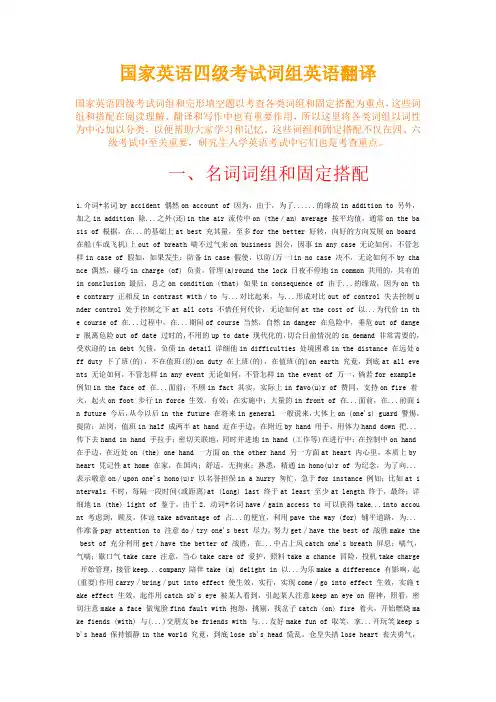
国家英语四级考试词组英语翻译国家英语四级考试词组和完形填空题以考查各类词组和固定搭配为重点,这些词组和搭配在阅读理解、翻译和写作中也有重要作用,所以这里将各类词组以词性为中心加以分类,以便帮助大家学习和记忆。
这些词组和固定搭配不仅在四、六级考试中至关重要,研究生入学英语考试中它们也是考查重点。
一、名词词组和固定搭配1.介词+名词by accident 偶然on account of 因为,由于,为了......的缘故in addition to 另外,加之in addition 除...之外(还)in the air 流传中on (the/an) average 按平均值,通常on the ba sis of 根据,在...的基础上at best 充其量,至多for the better 好转,向好的方向发展on board 在船(车或飞机)上out of breath 喘不过气来on business 因公,因事in any case 无论如何,不管怎样in case of 假如,如果发生;防备in case 假使,以防(万一)in no case 决不,无论如何不by cha nce 偶然,碰巧in charge (of) 负责,管理(a)round the lock 日夜不停地in common 共用的,共有的in conclusion 最后,总之on condition (that) 如果in consequence of 由于...的缘故,因为on th e contrary 正相反in contrast with/to 与...对比起来,与...形成对比out of control 失去控制u nder control 处于控制之下at all cots 不惜任何代价,无论如何at the cost of 以...为代价in th e course of 在...过程中,在...期间of course 当然,自然in danger 在危险中,垂危out of dange r 脱离危险out of date 过时的,不用的up to date 现代化的,切合目前情况的in demand 非常需要的,受欢迎的in debt 欠债,负债in detail 详细他in difficulties 处境困难in the distance 在远处o ff duty 下了班(的),不在值班(的)on duty 在上班(的),在值班(的)on earth 究竟,到底at all eve nts 无论如何,不管怎样in any event 无论如何,不管怎样in the event of 万一,倘若for example 例如in the face of 在...面前;不顾in fact 其实,实际上in favo(u)r of 赞同,支持on fire 着火,起火on foot 步行in force 生效,有效;在实施中;大量的in front of 在...面前,在...前面i n future 今后,从今以后in the future 在将来in general 一般说来,大体上on (one's) guard 警惕,提防;站岗,值班in half 成两半at hand 近在手边,在附近by hand 用手,用体力hand down 把...传下去hand in hand 手拉手;密切关联地,同时并进地in hand (工作等)在进行中;在控制中on hand 在手边,在近处on (the) one hand 一方面on the other hand 另一方面at heart 内心里,本质上by heart 凭记性at home 在家,在国内;舒适,无拘束;熟悉,精通in hono(u)r of 为纪念,为了向...表示敬意on/upon one's hono(u)r 以名誉担保in a hurry 匆忙,急于for instance 例如;比如at i ntervals 不时,每隔一段时间(或距离)at (long) last 终于at least 至少at length 终于,最终;详细地in (the) light of 鉴于,由于2.动词+名词have/gain access to 可以获得take...into accou nt 考虑到,顾及,体谅take advantage of 占...的便宜,利用pave the way (for) 铺平道路,为...作准备pay attention to 注意do/try one's best 尽力,努力get/have the best of 战胜make the best of 充分利用get/have the better of 战胜,在...中占上风catch one's breath 屏息;喘气,气喘;歇口气take care 注意,当心take care of 爱护,照料take a chance 冒险,投机take charge 开始管理,接管pany 陪伴take (a) delight in 以...为乐make a difference 有影响,起(重要)作用carry/bring/put into effect 使生效,实行,实现come/go into effect 生效,实施t ake effect 生效,起作用catch sb's eye 被某人看到,引起某人注意keep an eye on 留神,照看,密切注意make a face 做鬼脸find fault with 抱怨,挑剔,找岔子catch (on) fire 着火,开始燃烧ma ke fiends (with) 与(...)交朋友be friends with 与...友好make fun of 取笑,拿...开玩笑keep s b's head 保持镇静in the world 究竟,到底lose sb's head 慌乱,仓皇失措lose heart 丧失勇气,失去信心get/catch/take hold of 抓住,得到keep house 管理家务throw/cast light on/upon 使人了解,阐明bear/keep in mind 记住have in mind 考虑到,想到make up one's mind 下定决心,打定主意bring/put into operation 实施,使生效,使运行come/go into operation 施行,实行,生效keep pace (with) 与(...)齐步前进,与(...)并驾齐驱play a part (in) 起作用,参与,扮演角色take place 发生,进行,举行take the place of 代替,取代put into practice 实施,实行make progress 进步,进展give rise to 引起,导致为...的原因make sense 讲得通,有意义,言之有理ca tch sight of 发现,突然看见(go) on the stage 当演员take one's time 不着急,不慌忙keep track of 与...保持联系lose track of 失去与...的联系,不能跟上...的进展make use of 利用put to us e 使用give way 让路;屈服,让步;倒塌,坍陷make one's way 前往,行进,去make way 让路,腾出地方或位置3.名词词组的其他形式appeal to 呼吁,恳求attempt at 企图,努力attitude to/towards 态度,看法a great/good deal of 大量,非常,极其influence in 干涉,介入interference with 妨碍,打扰in troduction to 介绍a lot (of) 许多(的),大量(的)lots of 大量,许多fall in love (with sb)爱上(某人)reply to 回答,答复trolley bus 电车I.D. card 身份证credit card 信用卡no doubt 无疑地,很可能next door 隔壁out of doors 在户外face to face 面对面地a few 有些,几个quit e a few 不少,相当多a little 一点,一些little by little 逐渐地,一点点地quite a little 相当多,不少no matter 无论the moment (that) 一...(就)no more 不再fair play 公平竞赛,公平对待r est room 厕所,盥洗室primary school 小学side by side 肩并肩地,一起heart and soul 全心全意step by step 逐步地ahead of time 提前all the time 一直,始终once upon a time 从前once in a while 偶尔no wonder 难怪,并不奇怪word for word 逐字地decline with thanks 婉言谢绝二、动词词组和固定搭配1.动词十介词/副词account for 说明...的原因,是...的原因allow for 考虑到,顾及,为...留出预地appeal to 诉诸,诉请裁决(或证实等)arrive at 达成,达成ask after 探问,问起ask for 请求,要求attach to 附属于,隶属于;使依恋,使喜爱to begin with 首先,第一break down 损坏;(健康等)垮掉,崩溃break in 非法闯入;打断,插嘴break into 非法闯入,强行进入break off 中断,突然停止break out 逃脱,逃走;突然出现,爆发break through 突破,冲破;取得突破陛成就break up 印终止,结束;打碎,粉碎;散开,驱散bring about 导致,引起bring down 使落下,打倒;降低,减少bring forth 产生,提出bring forward 提出,提议;提前bring out 使显出;激起,引起;出版,推出bring to 使恢复知觉bring up 教养,养育;提出build up 逐渐积聚,集结;逐步建立;增进,增强burn out 烧光,烧毁...的内部;熄灭burn up 烧掉,烧毁;烧起来,旺起来;(使)发怒call for 叫(某人)来;要求,需要cal l off 取消call on/up 访问,拜访;号召,要求call up 召集;使人想起;打电话(给)care for 照顾,照料;喜欢carry off 夺走,拿走carry on 继续,进行carry out 实行,执行;实现,完成catch at 试图抓住,拼命抓catch on 理解,懂得;流行起来check in (在旅馆、机场等)登记,报到check out 结帐后离开,办妥手续离去check up (on) 检查,核实cheer up (使)高兴起来,(使)振作起来•clear away 把...清除掉,收拾clear up 清理;澄清,解决;(天)放晴come off 脱落,分开;结果,表现co me on [表示鼓励、催促等]快,走吧;开始,发生;进步,进展come out 发表,出版;出现,显露;结果是come round(around) 顺便来访;苏醒,复原come through 经历...仍活着,安然度过come to 苏醒;涉及,谈到;总数为,结果是come up 走上前来;发生,出现count on/upon 依靠,指望count up 共计,算出...的总数cover up 掩饰,掩盖;盖住,裹住cross off/out 划掉,勾销cut across 抄近路穿过,对直通过cut back 削减,缩减;急忙返回cut down 削减,减少;杀死,砍倒cut in 超车抢挡;插嘴,打断cut off 切断,阻碍;使分离,使隔绝cut out 删去,切去;戒除,停止ⅡB用cut short 中断,打断deal with 处理,对付;论述,涉及deep down 实际上,在心底die down 逐渐消失,变弱d ie out 逐渐消失,灭绝do without 没有...也行,用不着,将就draw in (火车、汽车)到站;(天)渐黑,(白昼)渐短draw up 起草,拟订;(使)停住dress up 穿上盛装,精心打扮;装饰,修饰drop by/in 顺便(或偶然)访问drop off 下降,减少;睡着,入睡;让(...)下车,把...放下drop out 退出,退学d ry out (使)干透dry up (使)干透,(使)干涸;(使)枯竭fall behind 落后,落在...的后面[/Post]fal l through 落空,成为泡影fall in 填满;填写;(for)替代fall out 填写;长胖,变丰满 find out 查明,找出,发现get across (将...)清楚,(使)被了解get around/round 走动,克服,设法回避(问题等);(协)抽出时间来做(或考虑) get at 够得着,触及;意思是,意指;查明,发现;指责get away 逃脱;走开,离开;(iwth)做了(坏事)而逃脱责罚get by 通过;过得去,(勉强)过活get down (从...)下来;写下;使沮丧;(to)开始认真做,着手做 get in 进入,抵达;收获(庄稼等);(证th)对...亲近get into (使)进入;卷入;对...发生兴趣get off (从...)下来;动身,出发;下班,结束(工作);逃脱惩罚get over 克服,解决(问题等);(从疾病、失望等)中恢复过来get through 度过(时间);(使)通过(考试),(使)(议案等)获得通过;(将...)讲清楚,完成;接通电话get together 相聚,聚集get up 起床;起立give away 泄露;赠送give back (归)还give in 交上,呈上;投降,屈服,认输give off 发出(光、声音等),散发出(气味)give out 分发;用完;消耗尽;发出(光、声音)give up 停止,放弃;(oneself)自首 go after 追求,追赶go ahead 开始;进行go by 遵守,遵循,依据;(时间)过去go d own 下降,减少;(船)沉没,(日)落;(with)生...病;(well或badly)(不)受欢迎,(不)被接受go for 袭击;适用于;选择,想要获得;喜爱go into 进入,参加;开始从事;研究,调查go off 爆炸,开火,突然响起;(电等)中断,停止;不再喜欢go out 外出(尤指参加社会活动);过时;(潮)退,(灯)熄,终止;送出,公布,播出go over 仔细检查,察看;复习,重做go round/around 足够分配;(with)常...与交往;流传;四处走动,到处活动go through 经历,遭受;详细检查,查找,详细讨论;获得通过,被批准;(with)将...干到底go under 沉没;失败;破产go up 上升,上涨,增长;正在建设中;烧毁,炸毁go with 跟...相配;与...相伴;附属于go without 没有hand down 把...传下去hand in 交上,递交hand on 把...传下去hand out 分发,散发hand over 交出,移交hang about/around 闲荡,闲呆着hang on 坚持,抓紧,不放;等待片刻,(打电话时)不挂断;有赖于;取决于hang up 挂断(电话):悬挂,挂起have on 穿着,戴着hold back 踌躇,退缩;阻止,抑制;隐瞒,保守(秘密等)hold on 坚持住,握住不放;(打电话时)不挂断,等-会hold out 维持,保持;坚持(要求),不屈服hold up 支持,支撑,延迟;抢劫;展示,举出hurry up (使)赶陕,匆匆完成improve on/upon 改进;胜过 keep bac k 阻止,抑制;隐瞒,保留keep off (使)不接近,(使)让开keep to 遵守,信守;坚持keep up 保持,(使)继续下去;使居高不下let down 放下,降低;使失望let off 宽恕,放过;开(枪),放(炮、烟火等)州)放let out 放走,释放;泄露,放出,发出lie in (问题、事情等)在于line up (使)排队,(使)排成行live on 靠...生活,以...为食物live through 度过,经受住live up to 符合,不辜负(期望);遵守,实践(诺言、原则等)look after 照管,照料,照料;注意,关心look at 看,朝...看;考虑,研究;看待look back (on) 回顾,回忆;回头看look for 寻找,寻求;惹来,招来look in 顺便看望,顺便访问look into 调查,观察look on 旁观,观看look out (for) 留神,注意look over 把...看一遍,把...过目;察看,参观look through 详尽核查;(从头至尾)浏览look up 好转;(在词典等中)查找;看望,拜访:(to)尊敬make for 走向,朝...前进;有助于,促进 make out 辨认出,看出;理解,了解;写出,开出 make up 印构成,组成;(为...)化妆;补充,补足;和解,重归于好;捏造,临时编造,虚mix up 混淆,弄混,弄乱 occur to 被想到,被想起 pass away 去世 pass (as) 充作,被看作,被当作 pass out 失去知觉,昏倒 pay back 偿还,还钱给(某人);向...报复,回报 pay off 还清(债);付清工资解雇(某人);向...行贿;得到好结果,取得成功 pay up 全部付清 pick out 选出,挑出,拣出;辨认出,分辨出 pick up 拿起,捡起;取(给),用车接载(人);好转,改进,增加(速度);(使)重新开始,继续;获得,学会 pull down 拆毁 pull in (车)停下,车进站,船(到岸) pull off 脱去,扯下;(成功地)完成 pull out 拔出,抽出,取出;(车、船)驶出;(使)摆脱困境 pull together 齐心协力,团结起来 pull up (使)停下 put across/over 解释清楚,使被理解 put aside 储存,保留;暂不考虑,把...放在一边 put away 放好,收好 put in 花费,付出(时间、精力等);申请,正式提出 put on 穿上,戴上;上演;增加(体重) put out 熄灭,关(灯);出版,发布;生产;伸出 put up 建造,支起,搭起;张贴;进行(抵抗等);提供,提名,提出;提高(价格、速度);为...提供食宿,投宿 refer to 参考,查阅;涉及,提到;指的是 ring off 挂断电话 run down 撞倒;说...坏话,贬低;停止运转,耗尽;减少,缩减;查找出,搜索到 run into 偶然碰见;遭遇(困难等);共计,达到...之多;撞在...上 run off 很快写出;复印出,印出;跑掉,逃掉 run over 在...上驶过,(撞倒并)碾过;把...很快地(或粗略地)过一遍 see off 为...送行 see through 看透,识破 see to 注意,照料 send for 派人去请,召唤;函购,函索 send in 呈报,递送,提交 set aside 留出,拨出(时间、金钱等);把...置于一旁,不理会 set back 推迟,延缓,阻碍;使花费 set down 记下,写下 set forth 阐明,陈述 se t off 出发,启程;引起,激起 set out 陈述,阐明;动身,起程;开始;摆放 set up 创立,建立,为...作准备;竖立,架起,建造;开业,开始经商 show off 炫耀,卖弄 show up 显露,暴露;露面,来到 shut out 把...排斥在外 sit in on 列席(会议),旁听sit up 不睡,熬皮;坐直speed up (使)加快速度stand by 站在...一边,支持,帮助;袖手旁观;坚持(决议等),遵守(诺言等);作好准备,准备行动 stand for 代替,代表,意味着,主张,支持;[用于否定、疑问句]容忍,接受 stand out 清晰地显出,引人注目;杰出,出色 stand up 站起来;(论点、证据等)站得住脚 step up 提高,加快,加紧stick out (把...)坚持到底;突出,显眼stick to 坚持,忠于,信守;紧跟,紧随;粘贴在...上t ake after (在外貌、性格等方面)与(父、母等)相像take away 减去 take down 拆卸;记下,写下 tak e...for 把...认为是,把...看成是take in 接受,吸收,接纳;理解,领会;欺骗;包括take off 脱下;起飞;匆匆离开 take on 开始雇用;呈现,具有;同...较量,接受...的挑战;承担,从事take o ver 接受,接管;借用,承袭 take to 对...产生好感,开始喜欢;形成...的习惯,开始从事take up with 与...成朋友take up 开始从事;把...继续下去;着手处理;占去,占据;(on)接受邀请 think o ver 仔细考虑throw away 扔掉,抛弃;错过(机会),浪费(金钱等)touch on/upon 谈到,论及 turn d own 关小,调低;拒绝turn in 交还,上交;上床睡觉turn off 关掉;拐弯,离开...转入另一条路 tu rn on 接通,打开 turn out 制造,生产;结果是;驱逐;关掉,旋熄turn over 翻过来,翻倒;移交,交;仔细考虑turn to 查阅;求助于,求教于turn up 开大,调大;出现,来到use up 用完,用光warm up (使)暖起来;(使)活跃起来,(使)热情起来;(使)作准备活动,(使)热身wear off 逐渐消失;渐渐减少wear out 穿破,磨损,用坏;(使)疲乏,(使)厌卷,(使)耗尽while away 消磨<时间)wipe ou t 擦净,擦掉;彻底摧毁,消灭work at/on 从事于,努力做work out 解决;算出;弄懂,理解;想出,制定出work up 激发,激起;制订出,精心作出write off 取消,勾销,注销2.后接动名词的动词搭配aim at 目的在于,旨在;瞄准;企图accuse...Of... 控告;谴责,depend on 取决于,视...而定;依靠,依赖;信赖,相信devote to 将...奉献给;把...专用(于)engage in 从事于,参加feel like 想要go on (时间)过去;灯亮;开始运行;继续,接着;进行,发生cannot/couldn't help 禁不住;不得不insist on 坚持,强调,坚决要求keep from 阻止,抑制keep up 继续进行、继续下去look forwa rd 曲协盼望,期待persist in 坚持不懈,执着prevent from 预防,防止put off 推迟,推延;阻止,劝阻set about 开始,着手succeed in 成功thank for 感谢think of 想起,记得;想出,提出;考虑,关心3.其他动词词组add up to 合计达,总括起来,意味着break away (from) 突然离开,强行逃脱catch up with 赶上;对...产生恶果com true (预言,期望等)实现,成为事实come up to 达到(标准),比得上come up wit h 提出,提供,想出do away with 废除,去掉fall back on 借助于,依靠fall in with 符合,同意,赞成;与...交往as follows 如下get along with 与...相处(融洽)get down to 开始认真处理,着手做give oneself up 自首give way to 给...让路,对...让步,被...代替go along with 赞同go back on 违背(诺言等)go in for 从事,参加;爱好hang on to 紧紧抓住;保留(某物)lend itself to 适合于let alone 不打扰,不惊动,更别提let go(of) 放开,松手live up to 符合,不辜负(期望);遵守,实践(诺言、原则等)look down on/upon 看不起,轻视look up to 尊敬make up for 补偿,弥补neve r mind 不要紧,没关系;不用担心,别管put in for 正式申请put up with 容忍,忍受refer to...a s... 把...称作,把...当作run out of 用完,耗尽serve...right 给...应得的惩罚set in 开始(并将延续下去)stand up for 支持,维持,保卫stand up to 勇敢地面对,抵抗;经得起,顶得住take...as 把...当作,认为think of...as 把...看作是,以为...是think better of 经过考虑对...改变主意(或看法)三、形容词组和固定搭配be able to (do) 能(做),会(做)be about to (do) 即将,正要be absent from 缺勤,缺课be abunda nt in 丰富的,富裕的be accustomed to 习惯于,适应于be acquainted with 与...相识,熟悉,了解be active in 积极于be afraid of 恐怕,害怕,担忧be alive to 注意到,对...敏感be angry at 因某事生气be angry with 对...发怒 be anxious about 担心,为...担忧 be anxious for 急切盼望,渴望 be anxious to(do) 渴望(做) be ashamed of 为...感到害臊 be aware of 意识到 be bad at 拙于,不善于 be based on 根据,以...为基础 be beside oneself 极度兴奋,对自己的感情失去控制 be better off 生活优裕起来,境况好起来 be bound to(do) 一定会,不得不 be careful to(do) 务必注意(做) be certain to(do) 一定(做),必然(做) be capable of 能够 be confident in 对...有信心 be characterized by 以...为特征 be clever at 擅长于 be combined with 与...结合 be composed of 由...组成 be concerned about 关心,挂念 be curious to(do) 很想(做) be dependent on/upon 取决于,依赖 be determined to (do) 决心(做) be different from 与...不同 be eager for 渴望 be eager to (do) 急于要(做) be equal to 等于 be famous for 以...著名 be fond of 喜欢,爱好 be free from 无...的,摆脱了...的 be friendly to 对...友好 be glad to (do) 乐于(做),对...感到高兴 be good at (doing) 善于,擅长 be good for 适于,在...期间有效 be grateful to 感谢,感激 be independent of 脱离...而独立,与...无关 be indispensable for 对...必不可少的 be interest ed in 对...感兴趣 be kinde enough to (do) 承...好意,恳请 be late for 迟到be likely to (do) 可能要,像是要be mad about 迷恋be well off 生活富裕be pleased to (do) 乐于be pleased with 对...感到满足be popular with 得人心的,受...欢迎的be present at 出席be proud of 以...自豪,因...感到满意be ready to (do) 装备好(做),乐意做be ready for 为...准备好be rich in 富于b e satisfied with 对...满意,满足于be second to 次于be short for 是...的缩写(简称)be short of 短缺be sick for 渴望be sick in bed 病在床上be sick of 对...感到厌倦be sorry for 对...感到抱歉be strict with 对...要求严格be suited to 适合于be supposed to (do) 应该,非...不可be sure of 坚信,确信be surprised at 对...感到惊奇be though with 结束be tired from 因...而厌倦be tired of 厌烦,对...厌倦be tired out 疲倦极了be true to 适用于be unconscious of 不知道...be unequal to 无法胜任...的be unfit for 不适合,不胜任be useful to 对...有用be wellup in 精通,熟悉be wild with jay 欣喜be willing to (do) 乐意...be worried about 为...而担心be worse off 处境较坏,情况恶化be worth (doing) 值得(做)be wrong with 有点毛病,有些不舒服四、其他词组和固定搭配above all 首先,尤其是after all 终究,毕竟,究竟at all [用于否定句]丝毫,一点all but 几乎,差不多;除了...都all over 遍及,到处 in all 总共,合计 not at all 一点也不 leave alone 让...独自呆着;不打扰,不干预 along with 和...一起,和...一道 one after another 一个接一个,相继one another 互相anything but 绝对不as...as 像...一样 as for 至于,关于 as though 好像,仿佛 as to 至于,关于 as well 也,同样 as well as 除...之外(也),既...又 not as/so...as 不如...那样 back and forth 反复地,来回地 (in) back of 在...后面,在...背后 because of 由于,因为 h ad better 还是...好,应该 both...and 既...又...,两个都 but for 倘没有,要不是 each other 互相 either...or 或...或 or else 否则,要不然 even if/though 即使,虽然 except for 除...外,除去;要不是由于 as/so far as 就...,到...程度 by far... 得多,最 far from 远远不,完全不 s o far 迄今为止;到某个程度 firs of all 首先 if only 要是...多好 by itself 独自地,自动地 in itself 本质上,就其本身而言 no less than 不少于,多达 as/so long as 只要,如果;既然,如果no longer 不再,已不 a great/good many of 相当多,很多 many a 许多的 more and more 越来越 m ore or less 差不多,几乎,大约 at most 至多,不超过 make the most of 充分利用,尽量利用 neit her...nor (既)不...也不,(既)非...也非 (every) now and then 时而,偶尔 just now 刚才,才不久;现在,眼下 now (that) 既然,由于off and on 断断续续地,间歇地,有时and so on 等等all at on ce 突然,忽然;同时,一起at once 立刻,马上;同时,一起once (and) for all 一劳永逸地,永远地once more/again 再一次by oneself 独自地,单独地every other 每隔一个的other than 不同于,非;除了over and over (again) 一再地,再三地all right 好,行;令人满意的,不错的;(健康)良好的,安然无恙的ever since 从那时起,自那时以来ever so 非常,极其or so 大约,左右so that 以便,为使;所以,因此so...that 如此...以致such as 诸如,例如such...that 那样的...以致that is(=i.e.) 就是说,即as though 好像,仿佛up to 胜任...的,适于...的;密谋...的;是...义不容辞的,是...的职责;取决于...的,须由...决定的;(时间上)一直到;(数目上)一直到,多达what a bout [征求意见时用]...怎么样what if 如果...将会怎样whether ...or 是...还是,不管...还是go wrong 发生故障,出毛病;出错,犯错误and yet 可是,然而at yet 至今abide by 履行,遵守adapt to 适应adhere to 粘附;胶着;坚持apologize(-ise)to,for 道歉,认错cling o粘住;依附;坚持collide with 抵触,冲突;碰撞,互撞compensate for 补偿,赔偿comply with 依从,服从,遵从co nceive of 设想,构思出conform to 遵守,依照,符合,顺应consult with 商量,商议cooperate wi th 合作,协作,相配合cope with (成功地)应付,(妥善地)处理deduce from 演绎,推断derive from 起源,衍生deviate from 背离,偏离 dispose of 处理,解决;去掉,丢掉,除掉 dwell on/upon 老是想着;详述 hinder from 阻碍,妨碍 impose on 把...强加于 originate in/from 起源于,来自,产生 participate in 参与,参加 preside t/over 主持,主管 prevail over 获胜,占优势 prevail on/upon 说服,劝说,诱使 reconcile to 使顺从(于),使甘心(于) reign to 使顺从restrain from 抑制,制止 sacrifice to 牺牲,献出,献祭,供奉 scrape by/through 勉强通过 specialize in 专攻,专门研究 testify to 表明,证明 flare up 突然燃烧起来;突然发怒 queue up 排成队(等候)diss atisfaction with/at 不满exposure to 暴露,显露;曝光objection to 反对,异议preference for /to 偏爱,喜爱;优惠;优先选择proficiency in 熟练,精通requirement for/to 需要,需要的东西,要求thirst for 渴望,热望by comparison 比较起来in sequence 依次,逐一at stake 在危急关头,在危险中in accordance with 与...一致,依照,根据on/in behalf of 代表,为了on the sly 偷偷地in excess of 超过to and for 来来回回on schedule 按时间表,及时,准时五、历年大学英语四、六级考试中出现的超纲词组和固定搭配put into use 使用,应用 be satisfied with 满足 be satisfied of 相信 hardly...when 刚...就... come to a conclusion 得出结论 avoid doing sth.避免干某事 decline invitation 辞谢邀请 agre e on/upon 取得一致意见 may(might) as well 还是...好 argue about 争论 take(make) a stand fo r 捍卫 take(make) a stand against 反对 come after 跟随 in support of 支持 lie up 躺着休息 b eside the question 离题 refresh one's memory 使人记起 bring to mind 使人想起 compile dictio nary 编字典 present sb.with sth.送给某人某礼物 indifferent to 不在乎 go on strike 罢工 ag ainst one's will 违心地 in one's will在... 遗嘱中 of one's free will 出于自愿with ease 容易,不费力prepare for 准备get to 开始;到达fall off 下降fall away 背离televise live 实况转播by the moment 到...时have intention of 有意,打算no intention of 无意,不打算have not th e least idea of 不知道have no desire for 对...没有欲望have desire to do sth.想做某事have sth.in stock 有现货be particular about 讲究the key to ...的答案(线索、办法)carry about 随身携带pass through 通过,经过pass for 被认为(当作)be of little value 没什么价值cure sb.of 治好某人...pull back 撤退pull round 掉头,转向;康复pull along 沿...拉die off 死去,凋谢dr op down 落下do sth.for a living 靠做某事谋生make a name of oneself 出名,扬名glimpse of 瞥见,一瞥glance at 瞥见,一瞥be on good terms with sb.与某人友好entitle sb.(to do)sth.给予某人(干)某事的权利beyond one's power 超出某人的能力take interest in 对...发生兴趣be an swerable for 应对...hundreds of 数以百计的be lacking in 缺乏break into tears(cheers) 突然哭(欢呼)起来in correspondence with 与...联系(通信)be advantageous to 对...有利be beneficial t o 对...有益in debt to sb.欠某人的债be it that 即使assure sb.of sth.委托某人某事put(se t) right 使恢复正常,纠正错误on the way 在途中off the way 远离正道keep on with 坚持make an attempt 试图in the mood for sth.对某事有心境escape doing sth.躲避干某事set a limit to 限制within the limit of 在...范围内call at 访问so blank (头脑)变成空白so dim (大脑)浑沌so faint 晕过去be subjected to 遭受be attached to 附属于not on any account 决不take pains to do sth.费尽苦心做某事a multitude of 大量(接复数名词)give rise to 导致give reason to 对...进行解释give suspicion to 对...怀疑make provision for 为...作准备be involved in 卷人,陷入be assigned to 被分配给...be bored to death 烦死了step into 插入,干涉adapt for 调整(以适应目标或需要)a close(narrow) shave 侥幸的脱险。
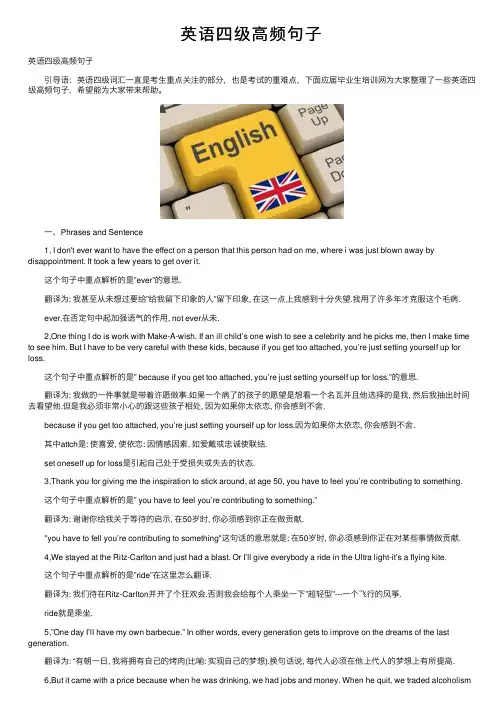
英语四级⾼频句⼦英语四级⾼频句⼦ 引导语:英语四级词汇⼀直是考⽣重点关注的部分,也是考试的重难点,下⾯应届毕业⽣培训⽹为⼤家整理了⼀些英语四级⾼频句⼦,希望能为⼤家带来帮助。
⼀、Phrases and Sentence 1, I don't ever want to have the effect on a person that this person had on me, where i was just blown away by disappointment. It took a few years to get over it. 这个句⼦中重点解析的是”ever”的意思. 翻译为: 我甚⾄从未想过要给”给我留下印象的⼈”留下印象, 在这⼀点上我感到⼗分失望.我⽤了许多年才克服这个⽑病. ever,在否定句中起加强语⽓的作⽤, not ever从未. 2,One thing I do is work with Make-A-wish. If an ill child’s one wish to see a celebrity and he picks me, then I make time to see him. But I have to be very careful with these kids, because if you get too attached, you’re just setting yourself up for loss. 这个句⼦中重点解析的是” because if you get too attached, you’re just setting yourself up for loss.”的意思. 翻译为: 我做的⼀件事就是带着许愿做事.如果⼀个病了的孩⼦的愿望是想看⼀个名⽡并且他选择的是我, 然后我抽出时间去看望他.但是我必须⾮常⼩⼼的跟这些孩⼦相处, 因为如果你太依恋, 你会感到不舍. because if you get too attached, you’re just setting yourself up for loss.因为如果你太依恋, 你会感到不舍. 其中attch是: 使喜爱, 使依恋: 因情感因素, 如爱戴或忠诚使联结. set oneself up for loss是引起⾃⼰处于受损失或失去的状态. 3,Thank you for giving me the inspiration to stick around, at age 50, you have to feel you’re contributing to something. 这个句⼦中重点解析的是” you have to feel you’re contributing to something.” 翻译为: 谢谢你给我关于等待的启⽰, 在50岁时, 你必须感到你正在做贡献. "you have to fell you’re contributing to something"这句话的意思就是: 在50岁时, 你必须感到你正在对某些事情做贡献. 4,We stayed at the Ritz-Carlton and just had a blast. Or I’ll give everybody a ride in the Ultra light-it’s a flying kite. 这个句⼦中重点解析的是”ride”在这⾥怎么翻译. 翻译为: 我们待在Ritz-Carlton并开了个狂欢会.否则我会给每个⼈乘坐⼀下”超轻型”---⼀个飞⾏的风筝. ride就是乘坐. 5,”One day I’ll have my own barbecue.” In other words, every generation gets to improve on the dreams of the last generation. 翻译为: “有朝⼀⽇, 我将拥有⾃⼰的烤⾁(⽐喻: 实现⾃⼰的梦想).换句话说, 每代⼈必须在他上代⼈的梦想上有所提⾼. 6,But it came with a price because when he was drinking, we had jobs and money. When he quit, we traded alcoholismfor being dirt-poor. 这个句⼦中重点解析的是”we traded alcoholism for being dirt-poor.”这句话的真正含义. 翻译为: 但是这有⼀定的代价: 因为当他饮酒的时候, 我们有⼯作和⼯钱.当他戒酒了, 我们就只有借酒消愁穷困潦倒了. we traded alcoholism for being dirt-poor: 其中的trade sth. for sth.以...和...交易,以酗酒和穷困潦倒交易. 7,It got so bad that he either quit or got fired. 这个句⼦中重点解析的是”so……that”在此句中的意义. 翻译为: ⼀般so...that是如此...以⾄于...的意思, 这⾥上下句不是因果关系: 变得糟糕的是, 他既没有辞职也没有被解雇.后半句that he either quit or got fired是so bad的补充状语从句, 补充说明so bad的细节, 不要太拘泥语法结构, 更应该注重的是: 1.英语语序特征, 2.英语国家的⼈的逻辑思维特征. 8,He was a tool pusher essentially, sold drill bits to oil-drilling companies. 翻译为: 他其实是⼀个⼯具推销者, 卖钻头给开采⽯油的公司. 9,I never think that I ‘m doing eight-minute cures on television. But I think that 50 percent of the solution to any problem lies in defining it first. I can be an emotional compass that points them down the path. 这个句⼦中重点解析的是”cures”与”lies in”的意思, 另外 “point……down”是词组吗? 翻译为: 我从未想过我在⽤电视做⼀个8分钟的治疗.但是我认为任何问题50%的解决⽅法在于先界定它.我可能是沿着路径指向它们的情感罗盘(指南针). cure: 名词, 治疗.point和后⾯的down可以认为没有关系, 这⾥不是词组, down这⾥的意思是”沿着”, 相当于along.down the path是介宾结构词组, 在句中作points them的补充状语. 建议: 不要从语法分析着⼿来学习英语, 因为这样效果很差.最好是提⾼阅读量, 让⼀切语法变为理所当然的事情, 让记忆单词成为阅读时的副产品. ⼆、 Dialogues /monologues 1,You can tell they lived during the Depression. 这个句⼦中"tell"是断定的意思, 常常把它的意思与(告知,告诉)联系在⼀起, 脑⼦便转不过弯来. 翻译为: 你可以断定他们⽣活在那时的⼤萧条期. 2,He reallv knows how to bring a person out. "bring a person out."是”⿎励⼀个⼈的”的意思. 翻译为: 他⾮常善于⿎励别⼈/使别⼈振作起来.。
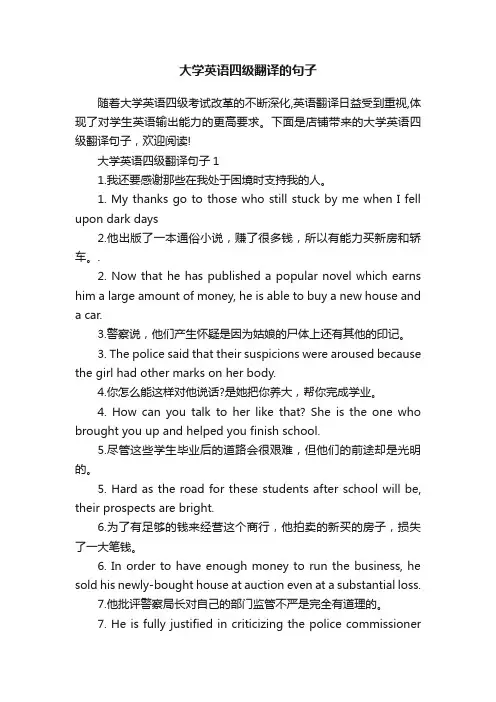
大学英语四级翻译的句子随着大学英语四级考试改革的不断深化,英语翻译日益受到重视,体现了对学生英语输出能力的更高要求。
下面是店铺带来的大学英语四级翻译句子,欢迎阅读!大学英语四级翻译句子11.我还要感谢那些在我处于困境时支持我的人。
1. My thanks go to those who still stuck by me when I fell upon dark days2.他出版了一本通俗小说,赚了很多钱,所以有能力买新房和轿车。
.2. Now that he has published a popular novel which earns him a large amount of money, he is able to buy a new house anda car.3.警察说,他们产生怀疑是因为姑娘的尸体上还有其他的印记。
3. The police said that their suspicions were aroused because the girl had other marks on her body.4.你怎么能这样对他说话?是她把你养大,帮你完成学业。
4. How can you talk to her like that? She is the one who brought you up and helped you finish school.5.尽管这些学生毕业后的道路会很艰难,但他们的前途却是光明的。
5. Hard as the road for these students after school will be, their prospects are bright.6.为了有足够的钱来经营这个商行,他拍卖的新买的房子,损失了一大笔钱。
6. In order to have enough money to run the business, he sold his newly-bought house at auction even at a substantial loss.7.他批评警察局长对自己的部门监管不严是完全有道理的。
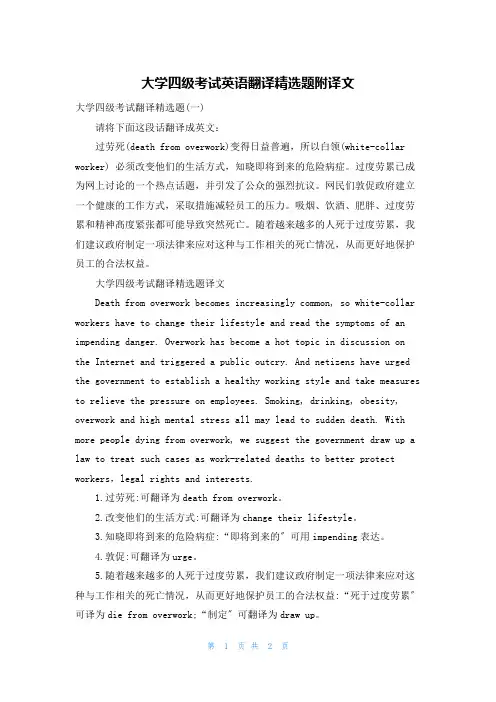
大学四级考试英语翻译精选题附译文大学四级考试翻译精选题(一)请将下面这段话翻译成英文:过劳死(death from overwork)变得日益普遍,所以白领(white-collar worker) 必须改变他们的生活方式,知晓即将到来的危险病症。
过度劳累已成为网上讨论的一个热点话题,并引发了公众的强烈抗议。
网民们敦促政府建立一个健康的工作方式,采取措施减轻员工的压力。
吸烟、饮酒、肥胖、过度劳累和精神髙度紧张都可能导致突然死亡。
随着越来越多的人死于过度劳累,我们建议政府制定一项法律来应对这种与工作相关的死亡情况,从而更好地保护员工的合法权益。
大学四级考试翻译精选题译文Death from overwork becomes increasingly common, so white-collar workers have to change their lifestyle and read the symptoms of an impending danger. Overwork has become a hot topic in discussion on the Internet and triggered a public outcry. And netizens have urged the government to establish a healthy working style and take measures to relieve the pressure on employees. Smoking, drinking, obesity, overwork and high mental stress all may lead to sudden death. With more people dying from overwork, we suggest the government draw up a law to treat such cases as work-related deaths to better protect workers,legal rights and interests.1.过劳死:可翻译为death from overwork。
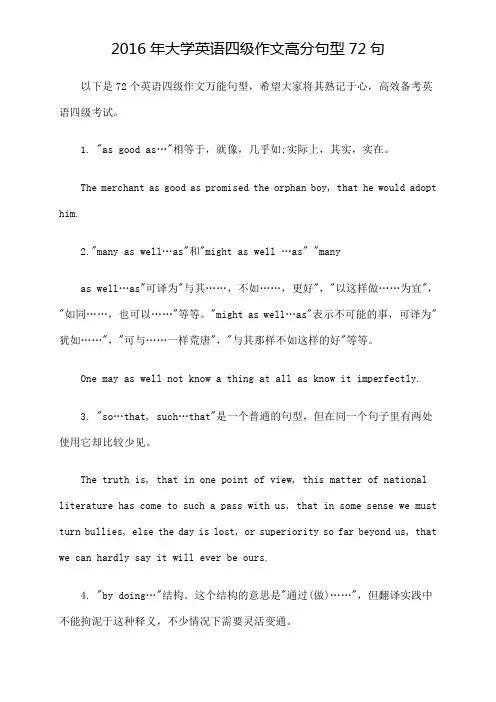
2016年大学英语四级作文高分句型72句以下是72个英语四级作文万能句型,希望大家将其熟记于心,高效备考英语四级考试。
1. "as good as…"相等于,就像,几乎如;实际上,其实,实在。
The merchant as good as promised the orphan boy, that he would adopt him.2."many as well…as"和"might as well …as" "manyas well…as"可译为"与其……,不如……,更好","以这样做……为宜","如同……,也可以……"等等。
"might as well…as"表示不可能的事,可译为"犹如……","可与……一样荒唐","与其那样不如这样的好"等等。
One may as well not know a thing at all as know it imperfectly.3. "so…that, such…that"是一个普通的句型,但在同一个句子里有两处使用它却比较少见。
The truth is, that in one point of view, this matter of national literature has come to such a pass with us, that in some sense we must turn bullies, else the day is lost, or superiority so far beyond us, that we can hardly say it will ever be ours.4. "by doing…"结构。
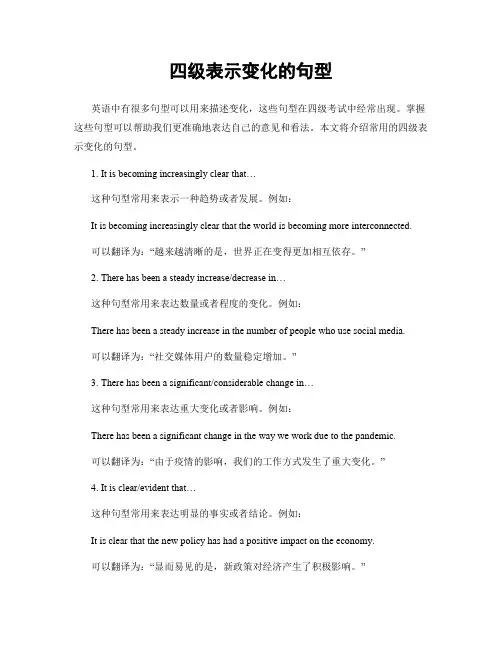
四级表示变化的句型英语中有很多句型可以用来描述变化,这些句型在四级考试中经常出现。
掌握这些句型可以帮助我们更准确地表达自己的意见和看法。
本文将介绍常用的四级表示变化的句型。
1. It is becoming increasingly clear that…这种句型常用来表示一种趋势或者发展。
例如:It is becoming increasingly clear that the world is becoming more interconnected.可以翻译为:“越来越清晰的是,世界正在变得更加相互依存。
”2. There has been a steady increase/decrease in…这种句型常用来表达数量或者程度的变化。
例如:There has been a steady increase in the number of people who use social media.可以翻译为:“社交媒体用户的数量稳定增加。
”3. There has been a significant/considerable change in…这种句型常用来表达重大变化或者影响。
例如:There has been a significant change in the way we work due to the pandemic.可以翻译为:“由于疫情的影响,我们的工作方式发生了重大变化。
”4. It is clear/evident that…这种句型常用来表达明显的事实或者结论。
例如:It is clear that the new policy has had a positive impact on the economy.可以翻译为:“显而易见的是,新政策对经济产生了积极影响。
”5. There are signs that…这种句型常用来表达变化的征兆。
例如:There are signs that the economy is beginning to recover.可以翻译为:“有迹象表明经济正在开始复苏。
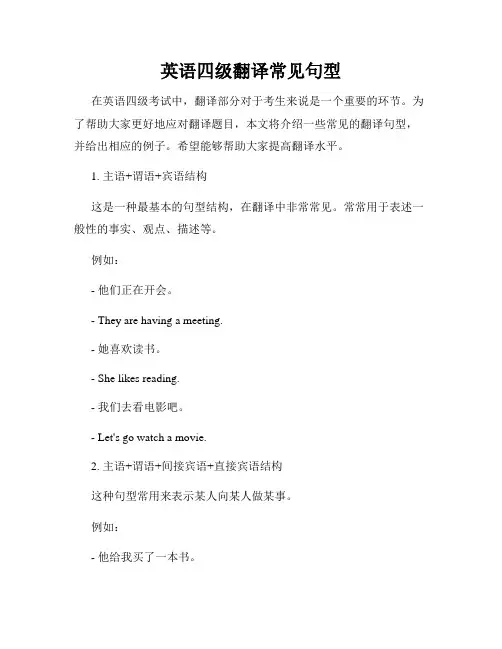
英语四级翻译常见句型在英语四级考试中,翻译部分对于考生来说是一个重要的环节。
为了帮助大家更好地应对翻译题目,本文将介绍一些常见的翻译句型,并给出相应的例子。
希望能够帮助大家提高翻译水平。
1. 主语+谓语+宾语结构这是一种最基本的句型结构,在翻译中非常常见。
常常用于表述一般性的事实、观点、描述等。
例如:- 他们正在开会。
- They are having a meeting.- 她喜欢读书。
- She likes reading.- 我们去看电影吧。
- Let's go watch a movie.2. 主语+谓语+间接宾语+直接宾语结构这种句型常用来表示某人向某人做某事。
例如:- 他给我买了一本书。
- He bought me a book.- 我们给他寄了一封信。
- We sent him a letter.- 她借给我一本小说。
- She lent me a novel.3. 主语+系动词+表语结构这种句型用来表示主语的性质、状态、特征等。
例如:- 青岛是一个美丽的城市。
- Qingdao is a beautiful city.- 他们的想法是正确的。
- Their ideas are correct.- 这个问题很复杂。
- This problem is complicated.4. 主语+系动词+宾语结构这种句型用来表示主语的感觉、看法、认识等。
例如:- 我觉得很累。
- I feel tired.- 他看起来很生气。
- He looks angry.- 他们认为这个计划是有希望的。
- They think the plan is promising.5. 被动语态被动语态在翻译中经常被使用,用来表示主语是动作的承受者。
例如:- 这本小说被翻译成了多种语言。
- This novel has been translated into various languages.- 他被授予了最佳演员奖。
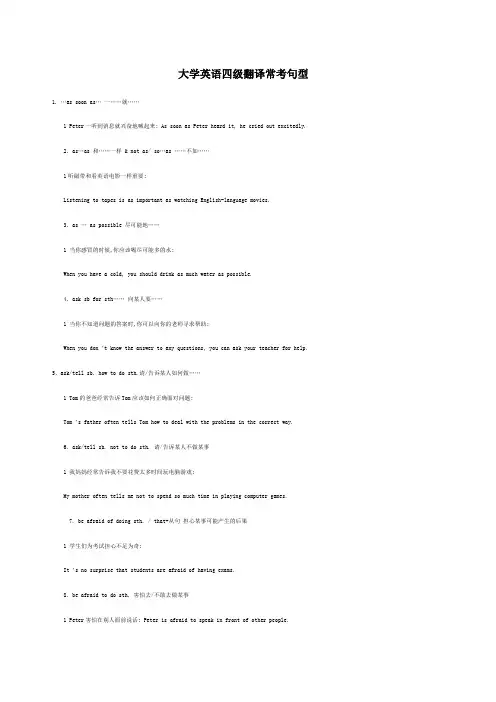
大学英语四级翻译常考句型1. …as soon as… 一……就……1 Peter一听到消息就兴奋地喊起来; As soon as Peter heard it, he cried out excitedly.2. as…as 和……一样& not as/ so…as ……不如……1听磁带和看英语电影一样重要;Listening to tapes is as important as watching English-language movies.3. as … as possible 尽可能地……1 当你感冒的时候,你应该喝尽可能多的水;When you have a cold, you should drink as much water as possible.4. ask sb for sth…… 向某人要……1 当你不知道问题的答案时,你可以向你的老师寻求帮助;When you don‘t know the answer to any questions, you can ask your teacher for help.5、ask/tell sb. how to do sth.请/告诉某人如何做……1 Tom的爸爸经常告诉Tom应该如何正确面对问题;Tom‘s father often tells Tom how to deal with the problems in the correct way.6. ask/tell sb. not to do sth. 请/告诉某人不做某事1 我妈妈经常告诉我不要花费太多时间玩电脑游戏;My mother often tells me not to spend so much time in playing computer games.7. be afraid of doing sth. / that+从句担心某事可能产生的后果1 学生们为考试担心不足为奇;It‘s no surprise that students are afraid of having exams.8. be afraid to do sth. 害怕去/不敢去做某事1 Peter害怕在别人面前说话; Peter is afraid to speak in front of other people.9. be busy doing sth./be busy with sth. 忙于做某事/忙于某事1他正忙着通过听磁带来学习英语; He is busy studying English by listening to tapes.11…为……准备/……迟到了/对……感到歉意1 我们已经准备好聚会了; We have got ready for the party.12 高兴……1你应该高兴,你能去欧洲;You should be glad you will travel to America..13、最……之一1 他是他们班最高的孩子之一; He is one of the tallest children in his class.2 纸是最有用的发明之一; Paper is one of the most useful inventions.3 故宫是北京最有名的风景名胜之一;The Palace Museum is one of the most famous places of interest in Beijing.推荐信息4北京是中国最大的城市之一; Beijing is one of the largest cities in China.5他是跑的最快的学生之一; He is one of the students who runs fastest.14带来/送给/寄给/借给/传递/告诉某人某事物1 请递给我那支笔; Please pass me that pen.3 到达美国后请立刻给我寄一封信; Please send me a letter as soon as you get toAmerica.4他给我带来一支玫瑰; He brought me a rose.5我借给他10元钱; I lent him 10yuan.15…或者……或者;不是……就是1 要么进来,要么出去; Either come in or go out.2 我想要去巴黎或伦敦; I want to visit either Paris or London.3 你喝茶也行,喝咖啡也行; You can have either tea or coffee.4 手机不仅能打电话,还能上网;The Mobile phone is used to either make a phone call or surf the Internet.5 不是他就是你喜欢蓝色;Either you or he likes blue.16喜爱/喜欢、讨厌做某事1 我喜欢集邮;I enjoy collecting stamps.2 我讨厌排队很长时间; I hate waiting for a long time.3 她喜欢在业余时间读书; She likes reading in her spare time.4他喜欢独处;He enjoys staying alone.5妈妈不喜欢坐飞机; Mum hates taking a plane.17 完成/介意/保持/继续做某事1 你写完作业了吗Have you finished doing your homework2 关上门你介意吗 Would you mind closing the door3 每日保持锻炼对你身体有好处;Keeping doing exercise is good for your health.4抱歉,让你久等了; I‘m sorry to keep you waiting so long.推荐信息18为……做好准备1 请为即将到来的考试做好准备;Please get ready the coming examination.2 伦敦已经做好了2012奥运会的准备; London has got ready for the 2012 OlympicGames.19最好不要做某事1 你最好别对老人大声嚷嚷; You‘d better not shout at the old man.20在某方面帮助某人1 她经常帮助妈妈做家务;She often helps her mum do the housework.2 请在英语方面帮助我; Please help me with my English.3 你能帮我擦黑板吗 Could you please help me clean the blackboard4 我认为帮别人做作业不是好事; I don‘t think it’s a good idea to help others do homework.5 他帮家长找到了那个迷路的孩子;He helped the parents find the lost boy.21. I don‘t think that+从句我想…不会…;我认为…不…1 我认为这不是学习英语最好的方法;I don‘t think that it’s the best way to learn English.2我认为没有电脑的生活是不完美的;I don‘t think that life is perfect推荐信息without computers.3 我认为你不应该撒谎; I don‘t think you should tell a lie.4 我认为在上课说话是不对的; I don‘t think it’s right to talk in class.5 我认为这件衣服并不漂亮; I don‘t think this clothes is very beautiful.22. I would like to do sth. 我想做…1我想让你帮帮我; I would like to let you give me a hand.23. It looks+形容词/ It sounds+形容词看上去…;听起来…1 看起来不错;It looks nice.2 听起来不错 It sounds good3 听起来很糟糕; It looks terrible.4 听起来像个不错的主意; It sounds like a good idea.5 你看起来像一个好人; You look like a good person.24. It‘s bad/ good for sb. to do sth. 做某事对某人有害/有益1 每天抽烟对你有害;It is bad for you to smoke every day.2 每天锻炼对你的健康有好处; It is good for your health to exercise every day.3 每天坚持说英语对你的英语学习有好处;It is good for your English study to keep speaking English every day.4 早睡早起有利健康;It‘s good for your health to go to bed early and get up early.5 不按时写英语作业对我们不好;It is bad for us to do English homework on time.25. It‘s a good idea to do sth. 去做某事是一个好主意;1 每天做大量的阅读是个好主意;It‘s a good idea to do lots of exercise.26. It‘s important for sb. to do sth.1 对他来说,学好英语很重要;It‘s important for him to learn English well.2 对每个人来说,保持健康很重要;It‘s important for everyone to keep healthy.3 每天吃大量的蔬菜是很重要的;It‘s very important to eat plenty o f vegetable.4 每天做大量的听力练习很重要的;It‘s very important to do lots of listening practice every day.5 能分辨是非是很重要的;It is very important to tell the difference between right and wrong.27. It‘s time for sth. ……的时间来了;该干……的时候了28. It‘s time for sb. to do sth. 是某人做……的时候了1是我们弹钢琴的时间了; It‘s time to play the piano.29. It‘s three metres long/high/wide. 它是三米长/高/宽30. It takes sb. some time to do sth. 做某事花费某人多长时间;1那道数学题真难,我花了1个小时的时间才做出来;The math exercise was so difficult that it took me an hour to work it out.32. keep sth.+形容词让…一直保持…/ make sth.+形容词使……怎么样1这可以让老师和学生都很高兴推荐信息This can make both the teacher and the students happy.33. look forward to doing sth.盼望做某事;1 我期待收到你的来信;I‘m looking forward to hearing from you.I‘m looking forward to your letter.34. make/let sb. not do sth. 使、让某人不做某事;1 谁把你弄哭啦Who makes you cry2 让我们去游泳吧;Let‘s go swimmin g.3 让我们去公园吧;Let‘s go to the park.4 妈妈让我尽快把屋子整理干净My mother made me clean the room as soon as possible.5 为了学好英语,老师总是让我们早晨大声朗读;In order to study English well, the teacher always makes us read aloud in the morning 35. neither…nor…既不……,也不……1老师和学生都不在教室;Neither the teacher nor the students are in the classroom.36. not… at all 根本不;一点也不1 我一点都不喜欢足球;I don‘t like football at all.2 这本书一点意思都没有;The book is not interesting at all.3 我一点也不想把笔记借给她;I don‘t want to lend the notebook to him at all.4 他根本不该再犯同样的错误;He shouldn‘t make the same mistake at all.5 他根本不知道怎么与别人相处;He doesn‘t know how to get on with others at all.37. not only…but also… 不但……而且……1不仅他想知道如何学好英语,我也想知道;Not only he but also I want to know how to study English well.38. not…until 直到……才1直到Miss Smith进来了,学生们才停止了说话;The students didn‘t stop talking until Miss Smith came .…,the other… 一个……,另一个……1Tom的父母都在中国,一个当老师,一个当医生;Tom‘s parents are in China. One is a teacher, the other is a doctor.40. some…, others… 一些……,另一些……1他给我们带来好多书;有的是告诉我们如何学习的,有的告诉我们保持健康的;He brought us lots of good books. Some tell us how to study, others tell us how to keep healthy.A toB 喜欢A胜过B1成千上万的孩子如今一边听流行音乐一边做作业,也不愿在安静的房间里做;Thousands of children nowadays prefer doing their homework to a background of pop-music to doing it in a quiet room./ hear sb. do sth. 看见/听见某人做某事1我们经常看到孩子们在警察的帮助下过马路;We often see the children cross the street with the help of the police.hear sb. doing sth. 看见听见某人在做某事1有人看见她从犯罪现场跑开;She was seen running away from the scene of the crime.2我们看见他们那时在打扫教室; We saw them cleaning the classroom at that time.…that… 如此…形容/副词…以致于……1学校太远了,男孩不能自己去; The school is so far that the boy can‘t get there by himself.45. such…that… 如此…名词…以致于……1学校太远了,男孩不能自己去; It‘s such a far school that the boy can’t get there by himself.46. spend …on sth./ in doing sth. 花费时间在…/花时间做……1别在那些没意义的事情上花如此多的时间;Don‘t spend so much time on thos e meaningless things.50. take sth. with sb. 随身带去某物; bring sth. with sb. 随身带来某物1你有必要每天随身携带一些钱;It‘s necessary for you to bring some money with you every day.2要下雨了;你最好随身带一把伞;It‘s going to rain. You had better take an umbrella with you.more…,the more… 越……;, 越……1你学的越多,你的成绩就越好;The more you learn, the better your score will be.2 你锻炼越多越健康; The more you exercise, the healthier you are.3 越多越好 The more, the better.52. There is something wrong with. ……;有了毛病1我的电脑一点毛病也没有; There is nothing wrong with my computer.…;to 太……而不能1这个老人太老了,不能自己照顾自己;The old man is too old to look after himself.to do 过去常常1 我弟过去个子不高,但是现在很高;My brother used to be short, but now he is tall.55. What about… How about………怎么样Why not do =Why don‘t you do 为什么不做……呢1 为什么不买个相机呢Why not buy a camera Why don‘t you buy a camera2 为什么不走59. Could you please do请你做……好吗 WillWould you please do着去呢Why not go on foot=Why don‘t you go on foot60. Would you like to do sth. 你想要做……吗1 我想喝杯咖啡; I would like to have a glass of coffee.。
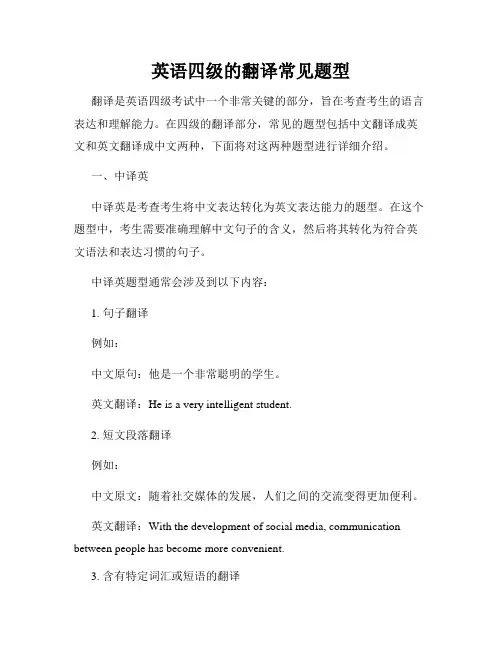
英语四级的翻译常见题型翻译是英语四级考试中一个非常关键的部分,旨在考查考生的语言表达和理解能力。
在四级的翻译部分,常见的题型包括中文翻译成英文和英文翻译成中文两种,下面将对这两种题型进行详细介绍。
一、中译英中译英是考查考生将中文表达转化为英文表达能力的题型。
在这个题型中,考生需要准确理解中文句子的含义,然后将其转化为符合英文语法和表达习惯的句子。
中译英题型通常会涉及到以下内容:1. 句子翻译例如:中文原句:他是一个非常聪明的学生。
英文翻译:He is a very intelligent student.2. 短文段落翻译例如:中文原文:随着社交媒体的发展,人们之间的交流变得更加便利。
英文翻译:With the development of social media, communication between people has become more convenient.3. 含有特定词汇或短语的翻译中文原句:科技的快速发展使得人们的生活更加便利。
英文翻译:The rapid development of technology has made people's lives more convenient.二、英译中英译中是考查考生将英文表达转化为中文表达能力的题型。
在这个题型中,考生需要准确理解英文句子的含义,然后将其转化为符合中文语法和表达习惯的句子。
英译中题型通常会涉及到以下内容:1. 句子翻译例如:英文原句:She has a strong passion for music.中文翻译:她对音乐有着强烈的热情。
2. 短文段落翻译例如:英文原文:The Internet has greatly changed our way of life.中文翻译:互联网极大地改变了我们的生活方式。
3. 含有特定词汇或短语的翻译英文原句:Globalization has brought both opportunities and challenges.中文翻译:全球化既带来机遇,也带来挑战。
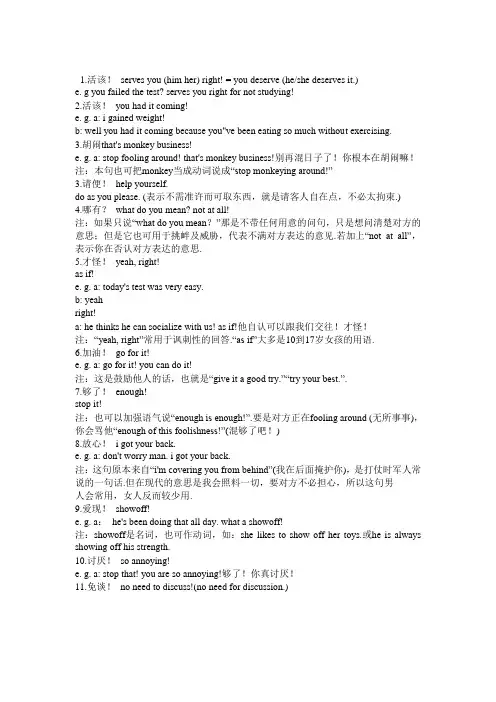
1.活该!serves you (him her) right! = you deserve (he/she deserves it.)e. g you failed the test? serves you right for not studying!2.活该!you had it coming!e. g. a: i gained weight!b: well you had it coming because you''ve been eating so much without exercising.3.胡闹that's monkey business!e. g. a: stop fooling around! that's monkey business!别再混日子了!你根本在胡闹嘛!注:本句也可把monkey当成动词说成“stop monkeying around!”3.请便!help yourself.do as you please. (表示不需准许而可取东西,就是请客人自在点,不必太拘束.)4.哪有?what do you mean? not at all!注:如果只说“what do you mean?”那是不带任何用意的问句,只是想问清楚对方的意思;但是它也可用于挑衅及威胁,代表不满对方表达的意见.若加上“not at all”,表示你在否认对方表达的意思.5.才怪!yeah, right!as if!e. g. a: today's test was very easy.b: yeahright!a: he thinks he can socialize with us! as if!他自认可以跟我们交往!才怪!注:“yeah, right”常用于讽刺性的回答.“as if”大多是10到17岁女孩的用语.6.加油!go for it!e. g. a: go for it! you can do it!注:这是鼓励他人的话,也就是“give it a good try.”“try your best.”.7.够了!enough!stop it!注:也可以加强语气说“enough is enough!”.要是对方正在fooling around (无所事事),你会骂他“enough of this foolishness!”(混够了吧!)8.放心!i got your back.e. g. a: don't worry man. i got your back.注:这句原本来自“i'm covering you from behind”(我在后面掩护你),是打仗时军人常说的一句话.但在现代的意思是我会照料一切,要对方不必担心,所以这句男人会常用,女人反而较少用.9.爱现!showoff!e. g. a:he's been doing that all day. what a showoff!注:showoff是名词,也可作动词,如:she likes to show off her toys.或he is always showing off his strength.10.讨厌!so annoying!e. g. a: stop that! you are so annoying!够了!你真讨厌!11.免谈!no need to discuss!(no need for discussion.)e. g. a: it's all settled. there's no need to discuss it anymore.全都确定了.所以就免谈了!12.真棒!that's great!13.好险!that was close!e. g. a: i'm so glad you made it. that was close!注:这里的close是很接近、幸好的意思,和开门关门(open and close)的close不同.14.闭嘴!shut up!15.好烂!it sucks!e. g. a: that sucks. don't buy it.注:这句话可用来形容人、事物的状况令人失望或十分不理想.16.真巧!what a coincidence!17.幼稚!immature!e. g. a: she's still sleeping with her favorite stuffed animal. she's so immature.what a baby!e. g. a: look at her still buying “hello kitty” stuff at age 30. what a baby!注:这句话对美国人来说侮辱的程度比较大.18.花痴!flirt!e. g. a: you are such a flirt! stop kissing up to him! he doesn't like you at all.你是花痴喔?别再讨好他了.他根本不喜欢你.注:不论男女,凡有如此行为的皆可用flirt表示.player (调情圣手)专指男性,tease (卖弄风情的女人)专指女性.19.痞子!riff raff!e. g. a: these people give me the creeps. riff raff!这些人使我起鸡皮疙瘩.真是一群痞子!注:在美国riff raff特别指人肮脏、下流.20.找死!playing with fire!e. g. a: are you crazy? you're playing with fire!注:这是表示某人在做的事很危险或很有挑战性.21.色狼!Pervert!e. g. A: He is such a pervert! I saw him looking at me in the toilet!注:这句话除了指性XXXXX,也指精神XXXXX,可简单地说“perv”,也可作动词,例如:“You are rally perverted.” .22.精彩!Super!e. g. A: Good job. That's super!注:这字有点旧了,但年轻人喜欢在形容词前面加super以强调它的意思,如“super-cool”.23.算了!Forget it!注:这句有“不谈这件事了”,或“这没什么”的意思.24.糟了!Shit!/ Fuck!/ Damn!e. g. A: Shit! This stinks!糟了!这好臭!注:这些都是低俗的用语,如同“***”等等咒骂的字,Damn是其中最温和的一个.25.废话!Bullshit!e. g. A: I don't believe it. That's bullshit!注:这句也可用crap来表示,它的语气比较温和,但还是一样无礼.26. XXXXX! Pervert!e. g. A: Let's get out of here. There are so many perverts here.注:中文的XXXXX从意思来看,其实比英文的pervert语意厌恶许多.27.吹牛!Brag.e. g. A: He's bragging. There's no way he could do that!28.装傻!Play dumb.e. g. A: Don't play dumb. You know about that.29.偏心. Biased (prejudiced).e. g. A: Stop saying those things about it. You're just biased.不要再这样说它了,你就是偏心.A:He's so prejudiced. He helps her just because he likes her.注:prejudice本意就是负面的,常用来职责对方不公正,bias则是中性字,如“The author has a bias for apple pie”(这个作家对苹果派有所偏好).30.无耻!Shameless!e. g. A: How could you do such a thing! You're shameless!这种事你也做得出来!你无耻!注:Shameless和no shame不同,no shame是not scared of being shameful,不怕丢脸的意思.31.你敢?You dare?e. g. A: I want to challenge you!B: You dare?32.赞成!I approve. / That's a good idea.e. g. A: Let's go for a walk.B: Sure. I approve.33.好饱!I'm stuffed.34.休想!Over my dead body!/ No way!e. g. A: You want to marry that guy? Over my dead body!35.成交!It's a deal!36.干嘛?What?/ What do you want?/ What's wrong? / what do you think you are doing? / what happened? / what for?3字篇37.不会吧?That won't happen will it?e. g. A: He will win the game. That won't happen will it?不会吧?No she's not like that is she?e. g. A: Are you sure she stole the jewels? No she's not like that is she?不会吧?No it won'twill it?e. g. A: He may not have much longer to live.B: No he won't diewill he?不会吧?No way! (or Be smart!较礼貌一点)37.起内哄. Fighting one's own. / In-fighting.e. g. A: That company wasted too much time fighting its own.A: I won't tolerate this in-fighting!38.狗屎运!Lucky bastard!e. g. A: He won the lottery! Lucky bastard!39.没风度. Crass e. g. A: He's so crass. There's no way I would date him.注:另外,vulgar, boorish也可以用来形容别人没风度.40.你说呢?So what?e. g. A: You are such a bad person. Who's gonna like you?B: So what?你说呢!You tell me! e. g. A: What are we going to do? B: You tell me!注:说“So what”时,若语气冷淡,则表示不在乎;若语气带挑衅,则表示不要人干涉,有“你管我”“那又怎样”的意思.41.别傻了!Wise up! E. g. A: Pleaseyou believe that? Wise up!Don't be silly! E. g. A: I think we can get everyone to give us money. B: Don't be silly. 注:当女孩子说“Don't be silly”时,大多是在打情骂俏.42.别闹了!Keep it down! E. g. A: You kids are too loud! Keep it down!注:Keep it down是不要闹了,但keep it up意思完全不同,是用来勉励对方继续努力下去.如果keep it up!用威吓的语气说就变成:若继续下去后果就不堪设想(你再给我试试看!).42.不许碰!Don't touch it! / Hands off!43.胆小鬼!Coward! E. g. A: He dare not do it! What a coward!44.考虑中!Sitting on the fence.e. g. A: I haven't decided what to do. I'm sitting on the fence.注:表示此人的决定仍摇摆不定,随时会受人影响.45.认输吧!Give in! e. g. A: Give in! You won't have a chance.注:也可用“give it up!”,意即“不要再试了,你只是在浪费时间”.46.抢劫啊!Rip off! E. g. A: That shirt cost me $3000! What a rip-off!注:rip当名词也可当动词,所以可说:He really ripped me off.” .47.别催我!Don't rush me. E. g. A: I'm on it! Don't rush me.别催我!我正在做呢!48.再联络!Keep in touch.49.干得好!Good job. / Well done!50.真划算. What a great deal! E. g. I got two bikes for the price of one. What a great deal!注:这里的deal是指买卖交易.在其他情况中“What's the deal?”“What'sgoing on?” 大家网 1 / 2 更多精品在大家! 大家网,大家的!专四备考资料下载汇总(词汇,听力,阅读,真题)更新中专四词汇专业四级考前恶补之语法词汇WORD下载专四词汇恶补之十篇电子书下载专四词汇冲刺练习共15期电子书下载专四填空训练及答案解析70篇电子书下载英语专业四级词汇与语法模拟练习及答案解析19篇电子书下载专四考试词汇与语法模拟题及答案解析72篇电子书(文本下载)专业四级词汇与语法全真模拟练习共41篇汇总及文本下载专四词汇练习及答案汇总专四常见名词和介词搭配短语汇总专四8000词逻辑辩证记忆汇总闭着眼睛背1000单词共50篇下载英语专四词汇表ABC及文本下载英语基础词汇及解析共170篇电子书下载英语词汇正误辨析共44篇电子书下载英语词汇搭配及解析共33篇电子书下载英语成语及解析共30篇电子书下载专四语法总结归纳:非谓语动词用法分析说明专四常见动词短语汇总专四语法词汇详解汇总及文本下载专四填空常考结构1-8汇总及文本下载专四语法重点总结汇总及文本下载英语语法共128篇下载专四必备语法汇总英语语法之代词用法共47篇电子书下载英语语法之名词用法共48篇电子书下载专业英语考试必背100个句式WORD下载专业英语四级必考语法WORD下载专四听力英语专四历年听力电子书下载(文本+MP3) 2 / 2 更多英语专四下载.doc 大家网,大家的! 更多精品在大家!专四历年听写答案(94-08)及MP3 [下载][推荐]专四常考听力习语专业英语四级必考语法英语专业四级Dictation听写50篇专业四级新闻听力练习答案及高频使用词汇下载专四阅读专四阅读理解练习及答案汇总专四每日一读汇总专业四级考前恶补之阅读完型WORD下载专四完形专四完型模拟练习及答案汇总专业四级考试分块练习汇总及答案WORD下载专四写作专业四级作文范文共36篇电子书下载专四作文范文汇总专四写作高招汇总专四写作综合指导附练习汇总及文本下载疯狂口语写作句型300句及文本下载专业四级考前恶补之写作WORD下载专四试题专业四级历年真题及答案1999-2008年合集 TEM-4 Exercise 共8篇汇总 09专四真题及答案汇总专四模拟试题附参考答案汇总及文本下载“Why are you doing this?”都是在询问“怎么了?”.51.看好喔!Watch me!注:这句是要别人注意自己在表演的特殊动作或技巧.52.死定了!I'm dead! E. g. A: I lost my computer. I'm dead. What am I going to do?I'm dead meat. E. g. A: I failed the exam! I'm dead meat!注:以上两句都是十分夸张的句子,表示真的不知如何是好,另外,常见的句子有“You'll be the death of me.”意思是指你和你惹的麻烦会毁了我.53.羡慕吧!Eat your heart out!e. g. A: Look out all these girls all over me! Eat your heart out! You're never gonna find a girl who will like you.注:说这句话的人有着炫耀的心态.54.无所谓. Whatever. E. g. A: You can do what you want. Whatever.注:这是年轻人很常用的俚语,除了无所谓外,还有以下的意思:①I don't care! (我才不在乎) ②etc.etc(等等,诸如此类的) ③No! ④That's not the way it is but I don't give a damn. (才不是那样的,不过我才不理它.)在不同上下文作不同解释.55.别装蒜!Don't play innocent. / Don't play dumb!56.去你的!Fuck you! (这句话十分粗俗,用生气或厌恶的语气说,有“滚你妈的蛋”之意.57.分摊吧!Let's go Dutch.58.你做梦!You're dreaming. E. g. A: That will never happen. You're dreaming.注:“Dream on!”意思也是一样,另外多了点玩笑的态度.59.你真笨!You're so lame!e. g. A: You're so lame. Even a kid can make it. Try again.注:Lame原来的意思是跛脚、不适当的意思.在这里指人不够酷、无能.60.并不想. Don't feel like it.e. g. A: Come out with us tonight. It'll cheer you up.B: I don't feel like it.61.好可惜. What a shame (pity).62.随便你. (It's) Up to you.Whatever.63.安分点!Behave! E. g. A: Stop making so much noise! Behave.注:年轻人用这句话的时候,多是在闹着玩的情况下,要对方“安分点”;男女朋友在打情骂俏时也会叫对方“安分”一点.64.再说啦!We'll talk about it later.65.分手吧!Let's break up.66.你看吧!I told you so! E. g. A: I told you so! It won't work.See! E. g. A: Like I said it's not as hard as you thought it'd be. See!67.不要脸!Shameless! E. g. A: I can't believe she's wearing that! Shameless!注:本句除了用shameless外,也可用“She has no shame. ”.68.别管他!Don't worry about it.69. E. g. A: I don't want to look bad.B: Don't worry about it. No one will notice. Don't pay attention to it.E. g. A: That guy over there is staring at me.B: Don't play attention to it.What the heck!E. g. A: Is it alright if I ask Dane to come over?B: What the heck!注:what the heck与what the ****!两个意思一样.69.怎么说?How do I say this?E. g. A: It's so hard to explain. How do I say this? What do you mean? E. g. A: I'm feeling sorry for him. B: What do you mean?70.胡扯的!That's rubbish! E. g. A: It's no like that at all. That's rubbish.71.蛮配的. Suits you well. E. g. That color looks really good on you. It suits you well.72.很恶心!Blood and gore.E. g. A: I don't like scary and violent movies. There's too much blood and gore.That's so gross! E. g. Will you stop making those gestures? That's so gross!注:“Blood and gore”多半是指电影而言,而“gross”在一般的情况下都可使用.73.懂了吗?Get it?E. g. A: We broke up two months ago! Stop calling me.Do you get it?(Do you) know what I mean? / know what I'm saying?E. g. A: That's the way it is. (Do you) know What I mean?You know? E. g. A: I really hate this. You know?74.别装了!Stop pretending. E. g. A: I know you hate it. Stop pretending.注:Pretending可用playing代替.75.神经病. Crazy! E. g. A: You can't do that! Crazy!注:这字暗示某人精神失常,行为反常;年轻人的俚语常以“mentally challenged”代替crazy.76.免了吧!No need! E. g. A: I want to make sure that I get it straight.B: There's no need. Forget it.注:“no need”可自成一句,也可在句中使用.如:There was no need to call the president.77.又来了!Again. E. g. A: Here it come again. I don't want to deal with it.That's typical. E. g. A: He's not taking responsibility for this mistake.B: That's typical.78.不骗你!Not joking. E. g. A: Believe me. I'm not joking.79.我请客.My treat. E. g. A: please it's your birthday. My treat!注:Treat也作动词用,如:I'll treat you tonight. (今晚我请客.)80.不赖嘛!Not bad.81.去死啦!Go to hell! E. g. A: you're such a bully. Go to hell.注:生气时在口语上诅咒别人去死前面有时会加上“you can”.82.冷静点!Calm down! E. g. A: Don't get so excited. Calm down.Keep your pants/shirt on! E. g. A: What's the hurry? Keep your pants/shirt on!83.我保证. I guarantee. E. g. A: You'll be fine. I guarantee.84.我发誓!I swear! E. g. A: It will never happen again. I swear!注:swear还有下列用法:①I swear by my bike that I can get anywhere in town in 15 minutes. (swear by…对着…发誓,表示很有信心).②The chief of justice swore in the president. (司法院长监督总统宣誓就职). ③I'm going to swear ff candy for the next month. (下个月我要戒吃糖果).85.来单挑!Let's fight one-on-one!e. g. A: let's go you and me let's fight one-on-one.B: All right leave the others alone. It's between you and me.86.正经点!Have some decency! E. g. A: Stop playing with the cake. Have some decency!Seriously… E. g. A: Ok stop joking around. Seriously…注:说这两句话的情况不同,“have some decency”通常是在对方有了一些恶作剧的行为之后,用来提醒他举止庄重一点.“Seriously…”则多用来转变话题,跟中文的“说真格的……”类似,说完这句话,说者就把话题转为严肃的内容.87.干脆点!Make up your mind!E. g. A: Geezwe've been over this a thousand times. Make up your mind!88.打扰了!Excuse me for bothering you.注:因为文化的差异,美国人很少有这种说法,大部分的美国人都不认为要说这么谦虚的话.89.清醒点!Sober up! E. g. A: Your parents are coming. Sober up.Wake up! (Wake up and smell the coffee!)e. g. A: Wake up! You look like you had a long night.清醒点,你看起来像是整夜没睡. 注:酒醉或吃药后,多会用“Sober up”.“Wake up!”或“Wake up and smell the coffee!”则是“脑袋里在想什么呀,醒醒吧你!”用来训斥别人面对现实.90.别理他!Don't mind him. E. g. A: Don't mind him. He's just playing.Forget him. E. g. A: He saw me steal the diamond!B: Forget him. I'll take care of him.注:forget him是“别理他!”,而“别理我!”是leave me alone.91.有眼光!Good taste. E. g. A: That looks really good. You've got good taste.92.谁说的?Who said that? E. g. A: It's not like that at all. Who said that?Says who? E. g. A: They cancelled our show.B: Says who?注:这两句话除了可用来询问是什么人说的,它的意思多半是用来否认所听到的消息.93.很难说. Hard to say.表示不清楚、不确定而难下定论.94.老实说. To tell you the truth (that…)/ Honestly…95.你撒谎!You lie!96.真恶心!So disgusting!97.真碍眼!Rubs me the wrong way.e. g. A: I can't put my finger on it but he really rubs me the wrong way.我说不上来,但他真碍眼!注:说这句话时通常有人惹到你,但也可能只是因为某人的外貌、言行令人不舒服.98.别想溜!Don't run away!注:run away也可指闪避问题,如:“Don't run away from your problems. ”是要对方面对,并解决问题.99.不客气. You're welcome. / No problem. / No bother./ Don't worry about it/ Don't mention it.100.不上道. Don't know how to play the game.E. g. A: Everyone accepted the bribe except him. He doesn't know how to play the game. 注:这是现代的俚语.有一句Playing the field,它的意思就大不一样了,是表示同时跟很多不同的人约会.101.你输了!You lost!102.吵死了!So noisy!103.不见得. Not necessarily. E. g. A: Everyone is gonna hate me.B: Not necessarily. (意味“情况可能正好相反”)104.兜风去. Let's go out for a drive.E. g. A: I feel so trapped in here. Let's go out for a drive!我觉得有被困在这里得感觉.咱们兜风去吧!Let's go out for some air!E. g. A: We've been studying all day. Let's go out for some air!注:going out for a drive是开车或骑车出去. going out for some air除了开车或骑车,也可表示用走来散心.105.怕了吧?Now you are scared aren't you?e. g. A: Now you are scared aren't you?B: Get that gun away from me!106.真低级!How low-class! E. g. A: What do you think about Mary's new skirt?B: How low-class! (通常不当别人面讲这句话)107.就这样. The way it is. E. g. A: You can't change anything. That's the way it is.Let it be. E. g. A: I know it's hard to accept. Let it be.注:let it be通常语气和缓,以安慰别人或使人平静.108.放弃吧!Give up!109.太神了!Cool!110.解脱了!Free at last! E. g. A: Thank god I graduated and I'm done with schoolforever. Free at last.111.要你管!Not your business. /None of your business./ It's none of your business. 注:有些用Beeswax代替Business.112.好恶心!Sick! E. g. A: Have you seen that movie “Friday the 13 th”?It's so sick. 113.小气鬼!Stingy bastard! E. g. A: He didn't even pay for my dinner! What a stingy bastard.What a miser! E. g. A: He's been wearing the same clothes since high school. What a miser! Can't he buy new clothes?注:stingy bastard语气很刻薄,因为“bastard”已经近乎粗话了.Stingy是形容词,小气,吝啬之意.Miser是名词.114.我招了!I admit… E. g. A: Yeah you're right. OKI admit it!注:本句用来当作争论失败得声明,或者用来表示道歉.115.别惹我!Don't bother me. E. g. A: OkI'll do whatever you want.But just don't bother me anymore.Stop picking on me. E. g. A: Can you stop picking on me?你能不能别再惹我?注:Bother意思是阻挠,困扰,或对某人唠叨.To pick on someone是指作弄人,找人麻烦.116.没什么. Not much… E. g. A: Hey! What's up!B: Not much…117.答对了. Bingo! / You are right!118.改天吧!Another time… E. g. A: Let's go out again tomorrow night.B: Maybe another time…I'll take a rain check. E. g. A: I'll take you out to dinner.B: I can't tonight but I'll take a rain check.注:rain check本意来自比赛因下雨而取消,所发给观众下次入场得延期证明;或是商店再减价时段特价品卖完时,发给客人在有货时可以相同优惠购买该商品得证明. 119.我不管!I don't care! E. g. A: But your rival has everyone's favor… B: I don't care! I'm going to beat him. Just watch.注:I don't give a damn! =I don't care.但是更粗俗一些.120.别多嘴. Enough! Shut up!121.耍大牌. Poser! E. g. A: Who does she think she is? A movie star? What a poser! 122.何必呢?What for?E. g. A: I want to go back to school.B: What for? You already have a Ph D!Why are you doing that? E. g. A: You have all the toys you need. Why are you buying more? Why are you doing that?注:依说话的语气,意思可能是刻薄的反讽,好奇的询问,或是冷漠不想搭理对方.123.书呆子. Nerd. E. g. A: All he does is study. He never goes out. What a nerd!124.不错吧?Look not bad huh?E. g. A: I've organized all this information for the presentation. Looknot badhuh?125.真可怕!That's terrible!126.别妄想!You're dreaming! / In your dreams.127.你真行!You're so great! / You 'da bomb! / You are the bomb.128.不难吃. Tastes good.129.真体贴!So affectionate! E. g. A: Did you see the way she touches him? So affectionate!注:另外一种口语用法是“lovey-duvvy”,但是比较负面,含有受不了别人如此亲热的意思.130.得了吧!Come on!131.末班车. Just made it. E. g. A: I was the 150th prize-winner! Just made it for the championship!注:本句得相反词就是名落孙山,“just missed it”.132.猜猜看!Guess!133.这简单!It's easy for me!4字篇134.不用担心!Don't be afraid. / Don't worry.135.长话短说!Make a long story short!136.少说废话!Cut the crap! / Bullshit (粗俗些)137.你懂什么?What do you know? / you don't know the half of it!注:后者批评对方对情况或事情的不了解,不清楚.138.我尽力了!I did the best I could.139.你疯了吗?Are you crazy? / Are you out of your mind?140.半斤八两. Same difference!141.这就怪啦!It doesn't add up! / It doesn't make any sense.E. g. A: I just bought milk yesterday… But we're out of it today.It doesn't add up!142.知足常乐. Easy to please.注:相反的就是“hard to please”(很难伺候)143.教坏小孩. Bad influence (on the kids).e. g. A: I don't want you to hang out with him anymore. He's such a bad influence on the children.144.小气巴拉. Scrooge!E. g. A: What a scrooge! He didn't even buy presents for them on Christmas!注:Scrooge这个字是从迪更斯的小说“小气财神”中的人物而来,也是圣诞颂歌中的一个主要角色.145.不识抬举. You just don't appreciate it.E. g. A: You don't know when a good thing's right in front of you. You just don't appreciate it.注:appreciate (欣赏)相反词是“scorn (藐视)”,“disparage (贬抑)”146.在说一次!Say again?注:say again是口头上,私下聊天时的用法.正式一点的像是“Pardon me?” “Excuse me?”或是“Could you repeat that please?”会比较有礼貌.147.你觉得呢?What do you think? / What's your opinion?(更正式些)148.岂有此理!How did it come to this?注:通常是事情出乎意料之外,而且多半是朝不好的方面发展.149.脸皮真厚!What nerve!E. g. A: How dare you talk back to your mother! What nerve!注:本句是指人大胆、无礼的行为.150.你急什么?What's the rush?151.没完没了. Will it never end?Doesn't he know when to stop?注:will it never end?就文法上应该是:Will it ever end?这里用Never,是在强调语气懂得无奈. Someone doesn't know when to stop意思是“有人就是不知道适可而止.” 152.太过分了!That's too much!153.太夸张了!That's an exaggeration!154.死都不要(干)!Over my dead body!注:这句的愿意是“等我死了再说”,用隐喻的方式表达说话者强烈的反对.155.真没想到. I had no idea.156.我的妈呀!Oh my god!157.赶时间吗?Are you in a hurry?注:in a hurry亦可用rushed for time或pressed for time代替.158.常有的事. Happens all the time.159.你真没用!You are useless!160.真没水准!No class!注:若以classy形容一个人,是指他对许多事物有高水准的品位,虽然“classy”多半是用来形容有钱人,但你对一些事有独到的品位,你也是classy噢.161.不一定啦!Not necessarily. (反义:definitely)162.别想骗我!Don't try to pull one over me!注:Over me是over my eyes,意思是“蒙骗”.163.想得没喔!In your dreams! (是指某事极不可能发生)164.想都别想!Don't even think about it!注:依上下文,这句话可表示威胁,泼冷水或安慰得意思.165.怎么搞的?What's eating you?形容对方看起来疲惫、沮丧、生气、不快乐等. What happened?一般人常用的句子.166.这也难怪!No wonder!167.你很烦耶!You're getting on my nerves! / You're really annoying!168.原来如此. So that's how it is!注:依上下文或语调,说这句话时可以一本正经的说,也可以是“原来如此啊!”带着讽刺的语气说.169.没日没夜. Day and night.170.一视同仁. Friend or foe…E. g. A: Whether you're a friend or foeI won't treat you any different.注:foe的意思是敌人,同“enemy”,虽然enemy较常见,但这里是要强调两个字一样都是f开头,所以用Foe.171.表里不一. Thinks one way but acts another.E. g. A: She's so hypocritical. She thinks one way but acts another.注:用这句形容一个人很虚伪,说的一套,做的又是一套.172.正是时候. It's about time!173.真是经典!It's a classic!174.多此一举!There's no need! (最常用同义词:Don't worry about it.)175.真是够了!That's enough! (说enough时加重语气,显露不耐烦的意思)176.骗你的啦!I'm joking. / I'm kidding. / I'm (just) pulling your chain.177.你有病啊?! You're sick!178.别害羞嘛!Don't be shy!179.勿失良机. Don't pass up a golden opportunity.注:简短一点可以说:“Don't pass it up!”或“Don't pass this up!”.180.两全其美. Everyone wins. / Good for both sides.注:这两句情况有些不同,“everyone wins”愿意是“每个人都赢.”因此,所指的对象可以不只是两个而已;“Good for both sides.”就特别针对只有两个对象的情况.181.一举两得. Shooting two birds with one stone. / Get two birds with one stone.182.心照不宣. Mutual understanding.注:本句与“tacit agreement”(默契)意思一样.183.自相残杀. At each other's throats. / Killing each other.184.好事成双. Good things come in pairs.185.别惹麻烦!Don't make trouble. / Stay out of trouble! 大家网 1 / 1 更多精品在大家! 大家网,大家的!大家网更多精品资料下载名人演说共67篇下载英语绕口令共40篇下载英语小短文共21篇电子书下载英语智慧背囊共120篇下载英语快乐求知共120篇电子书下载英语阅读之聚观天下共100篇电子书下载英语阅读之美丽人生共100篇电子书下载中国菜单英文译法共50篇电子书下载20首绝妙的英文爱情小诗集电子书下载疯狂英文背诵爱情加油总站及文本下载15篇经典爱情英文美文背诵及文本下载双语经典美文共约1500篇汇总及电子书下载双语经典美文96篇电子书下载单词背后的故事:194个英语单词的起源及巧记方法汇总及文本下载VOA常用1500单词下载分类词汇汇总及文本下载文学经典书籍下载大全英语沙龙创刊10年珍藏版下载英语成语及解析共30篇电子书下载《单词背上瘾》连载1~25及文本下载15篇经典爱情英文美文背诵及文本下载疯狂英文背诵爱情加油总站及文本下载科学美国人.Scientific.American.(1993-2009.3月下载)持续更新中186.搬弄是非!What a gossip!187.算你厉害. You win.(通常带有认输的语气)188.不见不散. I'm not leaving until I see you. / Be there be square.189.行行好嘛!Have a heart!190.没这回事!No such thing.191.安静一点!Be quiet.192.那又怎样?So what? (本句通常带有挑衅的语气)193.有话快说. If you have something to say…say it!194.拐弯抹角. Beat about the bush.195.慢吞吞的!Slow as molasses.注:molasses,原指精化糖的过程中所得到的黑色糖液.本句有点过时,但仍可使用. 196.很好玩的. Super fun.197.祝你好运!Good luck!198.口是心非. You say it but you don't mean it. (可以只说:You don't mean it.) 199.乱七八糟. What a mess!200.替天行道. Carry out God's will.201.下次再聊. Talk about it next time.202.我好[怕喔!I'm so scared!203.别搞砸了!Don't blow it.注:本句用来提醒别人别把事情弄糟了,语气通常是轻松的,又是也因为要警告对方而语气严肃.204.好久不见. Long time no see!205.这样也好. I guess so.206.自找麻烦. Looking for trouble.207.自讨苦吃. You're asking for it. / Asking for it.208.不够看啦!一般般啦!So-so.209.别来无恙?How've you been?210.有什么好?What's good about it?注:句中的good改为so good,意思就变成了“一点都不好”.211.社会败类. Scum of society. (表示很强烈的谴责,通常指无赖、罪犯及下流人物) 212.我在忙啦!I'm busy! (依讲话的口气,话中有不耐烦或忽视对方的意味) 213.放你一马. Off the hook. / Lucky this time. / Saved by the bell.E. g. 1) A: You are so lucky the teacher let you off the hook this time.2) A: You're lucky this time. Next time it won't be easy.3) A: Why haven't you finished your work?B: WellI've been working on…(Bell rings)A: Saved by the bell.注:off the hook本意是鱼脱钩,引申为逃过一劫.Saved by the bell常见于学生因下课铃声及时响起,而逃过答不出问题的窘境,或在拳击比赛中,被打得快输了,但因中场铃声及时响起而得以撑到下一场.214.歪打正着. Hit the jackpot. (俚语,表示非常幸运或成功)215.别搞错了. Don't take it the wrong way. (本意是“不要错估形势”或不要因误会我说的的话而生气”.)216.别管闲事!Stop bossing me around!注:它的形容词bossy.在不需要帮忙时,硬要帮忙出点子、下命令,就会被说是“You are so bossy”.217.求之不得. Want it badly.I wouldn't miss it for the world.注:前者是指想要某物而不惜任何代价,前后句接得通常是I would give anything my arms my legs…”等.而I wouldn't miss it for the world是指“我一定会去”或“我一定会参加”.218.想开点吧!Take it easy. / Don't take it so hard.注:Don't take it so hard是安慰别人的话,要人家“不要把事情想得那样糟”,或者是“不要让它困扰你.”219.不如这样…… What about…220.有口难言. I can't say… (指是知道答案,但为了某种原因而不能讲出来.)221.你还顶嘴!Talk back. (指回答的态度或方式很不礼貌)222.我不行了. I'm done.注:在以下几种情况可以用I'm done来表达:①感到太累,不耐烦而不想做某事.②吃太饱而不想再吃. ③完成某件工作.另外,也可以用“I'm finished.”来代替,意思一样.223.我就知道!I knew it! (表示事情打一开始我就知道是怎么会事了)224.看得出来. You can tell.E. g. A: You gained weight didn't you? You can tell.225.来得及吗?Is it too late? (指是否还有足够得时间)Can we make it? (指我们可否及时完成或我们可否及时赶到)226.不买可惜. Hard to pass up.E. g. A: Clothes on sale are hard to pass up.注:Pass up放弃、拒绝,也就是turn down的意思.227.快去快回!Hurry back!228.你说了算. Up to you.You're the Boss. Anything you say.229.放松一下!Relax!230.习惯就好!It's fine once you get used to it. / You'll be fine.231.自作自受!Serves you right! / You get what you deserve.232.我急着要. I need it badly.233.说话算话!You can't take it back!234.笨蛋一个!Idiot!235.真没礼貌!How rude!236.你还嘴硬!Don't be so stubborn!e. g. A: I can do it! Let me try again!B: You're injured! Don't be so stubborn.237.借看一下. Let me take a look-see. (俚语用法)。
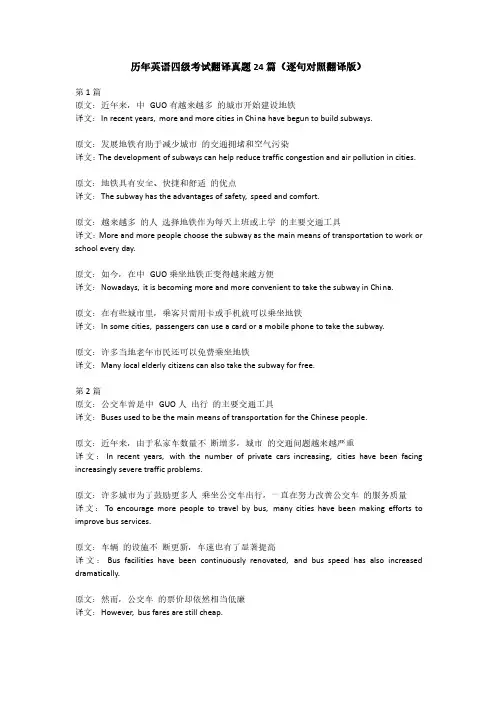
历年英语四级考试翻译真题24篇(逐句对照翻译版)第1篇原文:近年来,中GUO有越来越多的城市开始建设地铁译文:In recent years,more and more cities in Chi na have begun to build subways.原文:发展地铁有助于减少城市的交通拥堵和空气污染译文:The development of subways can help reduce traffic congestion and air pollution in cities.原文:地铁具有安全、快捷和舒适的优点译文:The subway has the advantages of safety,speed and comfort.原文:越来越多的人选择地铁作为每天上班或上学的主要交通工具译文:More and more people choose the subway as the main means of transportation to work or school every day.原文:如今,在中GUO乘坐地铁正变得越来越方便译文:Nowadays,it is becoming more and more convenient to take the subway in Chi na.原文:在有些城市里,乘客只需用卡或手机就可以乘坐地铁译文:In some cities,passengers can use a card or a mobile phone to take the subway.原文:许多当地老年市民还可以免费乘坐地铁译文:Many local elderly citizens can also take the subway for free.第2篇原文:公交车曾是中GUO人出行的主要交通工具译文:Buses used to be the main means of transportation for the Chinese people.原文:近年来,由于私家车数量不断增多,城市的交通问题越来越严重译文:In recent years,with the number of private cars increasing,cities have been facing increasingly severe traffic problems.原文:许多城市为了鼓励更多人乘坐公交车出行,一直在努力改善公交车的服务质量译文:To encourage more people to travel by bus,many cities have been making efforts to improve bus services.原文:车辆的设施不断更新,车速也有了显著提高译文:Bus facilities have been continuously renovated,and bus speed has also increased dramatically.原文:然而,公交车的票价却依然相当低廉译文:However,bus fares are still cheap.原文:现在,在大多数城市,许多当地老年市民都可以免费乘坐公交车译文:Now,in most cities,many local elderly citizens can take a bus for free.第3篇原文:过去,乘飞机出行对大多数中GUO人来说是难以想象的译文:In the past,traveling by plane was unimaginable for most Chinese people.原文:如今,随着经济的发展和生活水平的提高,越来越多的中GUO人包括许多农民和外出务工人员都能乘飞机出行译文:Today,with the development of Chi na's economy and the improvement of people's living standards,more and more Chinese people,including many farmers and migrant workers,can travel by air.原文:他们可以乘飞机到达所有大城市,还有很多城市也在筹建机场译文:They can fly to all major cities,and many other cities are also planning to build airports.原文:航空服务不断改进,而且经常会有廉价机票译文:Air services continue to improve,and there are often cheap flights.原文:近年来,节假日期间选择乘飞机外出旅游的人数在不断增加译文:In recent years,the number of people choosing to travel by air during holidays has been increasing.第4篇原文:华山位于华阴市,距西安120公里译文:Mount Hua is located in Huayin City(Shaanxi,Chi na),120kilometers away from Xi'an.原文:华山是秦岭的一部分,秦岭不仅分隔陕南与陕北,也分隔华南与华北译文:It is part of the Qin Mountains,which divide not only northern and southern Shaanxi,but also south and north Chi na.原文:与从前人们常去朝拜的泰山不同,华山过去很少有人光临,因为上山的道路极其危险译文:Unlike Mount Tai that used to be frequented by pilgrims,Mount Hua was not well visited by pilgrims as the roads up the mountain were extremely dangerous.原文:然而,希望长寿的人却经常上山,因为山上生长着许多药草,特别是一些稀有的药草译文:Back then,however,those who wished to enjoy longevity ventured in Mount Hua quite a lot because numerous herbs,rare ones in particular,grew in the mountain.原文:自上世纪90年代安装缆车以来,参观人数大大增加译文:Since cable cars were installed in Mount Hua in the1990s,the number of visitors has increased dramatically.第5篇原文:HUANG山位于中GUO东部安徽省南部,它风景独特,尤以其日出和云海著称译文:Located in southern Anhui province in eastern Chi na,Huangshan is known for its unique natural scenery,particularly sunrises and sea of clouds.原文:要欣赏大山的宏伟壮丽,通常得向上看译文:To appreciate the magnificence of the mountain,you have to look upward in most cases;原文:但要欣赏HUANG山美景,得向下看译文:while to enjoy the fascinating landscape of Huangshan,you've got to look downward.原文:HUANG山的湿润气候有利于茶树生成,是中GUO主要产茶地之一译文:The humid climate of the area offers favorable conditions for tea trees to grow,which makes the surrounding area of Huangshan one of the major producers of tea.原文:这里还有许多温泉,其泉水有助于防治皮肤病译文:The mountain is also home to numerous hot springs,which are helpful for preventing skin disease.原文:HUANG山是中GUO主要旅游目的地之一,也是摄影和传统GUO画ZUI受欢迎的主题译文:As one of the top tourist destinations in Chi na,Huangshan represents the most popular theme of photographic works and traditional Chinese paintings.第6篇原文:泰山位于山东省西部,海拔1500余米,方圆约400平方公里译文:Located in western Shandong province,Mount Tai stands over1500meters above sea level and covers an area of about400square kilometers.原文:泰山不仅雄伟壮观,而且是一座历史文化名山,过去3000多年一直是人们前往朝拜的地方译文:It is a renowned mountain which is not only spectacular but also of historical and cultural significance.Pilgrims have been visiting Mount Tai for the last over3000years.原文:据记载,共有72位帝王曾来此游览译文:In recorded history,72emperors once came here to make a tour.原文:许多作家到泰山获取灵感,写诗作文,艺术家也来此绘画译文:Mount Tai has seen many writers who have traveled here for inspiration to make poems and compositions.Artists also come here for painting.原文:山上因此留下了许许多多的文物古迹译文:That explains why Mount Tai features numerous cultural relics and historic sites.原文:泰山如今已成为中GUO一处主要的旅游景点译文:It has now become one of the leading tourist attractions in Chi na.第7篇原文:珠江是华南一大河系,流经广州市,是中GUO第三长的河流,仅次于长江和HUANG 河译文:As a major river system in southern Chi na,the Pearl River,which runs through Guangzhou,capital of Guangdong Province,is the third longest in Chi na,after the Yangtze River and the Yellow River.原文:珠江三角洲是中GUOZUI发达的地区之一,面积约11000平方公里译文:The Pearl River Delta,which covers an area of11000square kilometers,represents one of the most developed regions in Chi na.原文:它在面积和人口方面也是世界上ZUI大的城市聚集区译文:It is also the biggest city gathering area in the world in terms of size and population.原文:珠江三角洲九个ZUI大城市共有5700多万人口译文:Put together,the nine largest cities in the Delta are home to a combined population of over57million.原文:上世纪70年代末中GUO改GE开放以来,珠江三角洲已成为中GUO和世界主要经济区域和制造中心之一译文:Since reform and opening up was initiated in the late1970s,the Pearl River Delta has become one of the leading regional economies and manufacturing centers in Chi na and around the world.第8篇原文:长江是亚洲ZUI长、世界上第三长的河流译文:The Yangtze River is the longest in Asia and the third longest in the world.原文:长江流经多种不同的生态系统,是诸多濒危物种的栖息地,灌溉了中GUO五分之一的土地译文:The river,which flows through varied ecosystems along its passage,offers habitats for many endangered species and provides irrigation for1/5of Chi na's land.原文:长江流域居住着中GUO三分之一的人口译文:The Yangtze River basin is home to1/3of Chi na's population.原文:长江在中GUO历史、文化和经济上起着很大的作用译文:The river plays a very important role in Chi na historically,culturally and economically.原文:长江三角洲产出多达20%的中GUOGUO民生产总值译文:The Yangtze River Delta contributes up to20%of Chi na's GNP.原文:几千年来,长江一直被用于供水、运输和工业生产译文:For millennia,the Yangtze River has been used for water supply,shipment and industrial activities.原文:长江上还坐落着世界ZUI大的水电站译文:The world's largest hydropower station is also built on the river.第9篇原文:HUANG河是亚洲第三、世界第六长的河流译文:The Yellow River is the third longest in Asia and the sixth longest in the world.原文:“HUANG”这个字描述的是其河水浑浊的颜色译文:Yellow describes the color of the muddy river.原文:HUANG河发源于青海,流经九个省份,ZUI后注入渤海译文:The river originates in Qinghai,and runs through nine provinces before it empties into the Bohai Sea.原文:HUANG河是中GUO赖以生存的几条河流之一译文:The Yellow River is one of the several rivers that sustain life and livelihood in Chi na.原文:HUANG河流域是中GUO古代文明的诞生地,也是中GUO早期历史上ZUI繁荣的地区译文:The Yellow River basin is the cradle of Chi na's ancient civilization and was once the most prosperous region in early history of Chi na.原文:然而,由于极具破坏力的洪水频发,HUANG河曾造成多次灾害译文:However,the Yellow River had triggered many disasters due to frequent catastrophic floods.原文:在过去几十年里,ZF采取了各种措施防止灾害发生译文:As such,over the past several decades,the Chinese government has taken a host of steps to prevent such disasters.第10篇原文:随着中GUO的改GE开放,如今很多年轻人都喜欢举行西式婚礼译文:With Chi na's reform and opening up,quite a number of youngsters would like to celebrate their weddings in western style.原文:新娘在婚礼上穿着白色婚纱,因为白色被认为是纯洁的象征译文:The bride wears a white wedding dress at the ceremony,as white is regarded as a symbol of purity.原文:然而,在中GUO传统文化中,白色经常是葬礼上使用的颜色译文:However,in traditional Chinese culture,white is a color that is often used in funerals.原文:因此务必记住,白花一定不要用作祝人康复的礼物,尤其不要送给老年人或危重病人译文:That's why it's necessary to keep in mind that white flowers must not be gifts for patients, especially not for the elders or critically sick patients.原文:同样,礼金也不能装在白色信封里,而要装在红色信封里译文:Similarly,the cash gift shouldn't be packed in a white envelope,but in a red one.第11篇原文:在中GUO文化中,HUANG颜色是一种很重要的颜色,因为它具有独特的象征意义译文:In Chinese culture,yellow is a color occupying a fairly prominent position,which is endowed with unique symbolic significance.原文:在封建社会中,它象征统治者的权力和权威译文:In the feudal society,yellow stands for the ruler's power and authority.原文:那时,HUANG色是专为皇帝使用的颜色,皇家宫殿全都漆成HUANG色,皇袍总是HUANG色的,而普通老百姓是禁止穿HUANG色衣服的译文:At that time,yellow was specially designed for the emperor,with the royal palace painted yellow and the imperial robe always being yellow while the ordinary people were never being permitted to wear yellow.原文:在中GUO,HUANG色也是收获的象征译文:In Chi na,yellow is also the symbol of harvest.原文:秋天庄稼成熟时,田野变得一片金HUANG,人们兴高采烈,庆祝丰收译文:When crops are ripening in the fall,farmers celebrate the harvest in high spirits,with the fields taking on a vast expanse of golden appearance.第12篇原文:在中GUO文化中,红色通常象征着好运、长寿和幸福,在春节和其他喜庆场合,红色到处可见译文:The color of red in Chinese culture usually symbolizes good luck,longevity and happiness. Red can be found everywhere during Chinese Spring Festival and on other joyous occasions.原文:人们把现金作为礼物送给家人或亲密朋友时,通常放在红信封里译文:Cash is often put in red envelopes and sent to family members or close friends as a gift.原文:红色在中GUO流行的另一个原因是人们把它与中GUOGE命和GCD相联系译文:Its popularity in Chi na can also be attributed to the fact that people associate it with the Chinese Revolution and Communist Party.原文:然而,红色并不总是代表好运与快乐,因为从前S者的名字常用红色书写译文:However,red does not signify good luck and joy ail the time in that the name of the dead used to be written in red.原文:用红墨水写中GUO人名被看成是一种冒犯行为译文:Thus it is regarded as an offense to write the names of Chinese people in red ink.第13篇原文:乌镇是浙江的一座古老水镇,坐落在京杭大运河畔译文:Located by the Beijing-Hangzhou Grand Canal,Wuzhen is an ancient waterside town in Zhejiang Province.原文:这是一处迷人的地方,有许多古桥、中式旅店和餐馆译文:It is a fascinating place where there are a good many of ancient bridges,Chinese hotels and restaurants.原文:在过去一千年里,乌镇的水系和生活方式并未经历多少变化.是一座展现古文明的博物馆译文:During the past1,000years,the water system and people's lifestyle in Wuzhen have undergone so little change that Wuzhen has become a museum displaying the ancient civilization.原文:乌镇所有房屋都用石木建造译文:All the houses in Wuzhen were built out of stones and woods.原文:数百年来,当地人沿着河边建起了住宅和集市译文:For hundreds of years,the locals have built up residences and held fairs along the canal.原文:无数宽敞美丽的庭院藏身于屋舍之间,游客们每到一处都会有惊喜的发现译文:As countless beautiful and spacious courtyards are hidden in between the houses,visitors find pleasant surprises everywhere.第14篇原文:功夫是中GUO武术的俗称,中GUO武术的起源可以追溯到自卫的需要.狩猎活动以及古代中GUO的军事训练译文:The Chinese Martial Arts,commonly known as Kung Fu,can trace its origin back to the needs of self-defence,hunting and ancient Chinese military training.原文:它是中GUO传体育运动的一种,年轻人和老年人都练译文:Being one of the traditional Chinese physical activities,it can be practiced by both the young and the old.原文:它已逐漸演变成了中GUO文化的独特元素译文:It has gradually evolved into a distinct element of Chinese culture.原文:作为中GUO的GUO宝,功夫有上百种不同的风榕,是世界上练得ZUI多的武术形式译文:As a Chinese national treasure,Kung Fu has hundreds of different styles and is the most practiced form of martial arts in the world.原文:有些风格模仿了动物的动作,还有一些受到了中GUO哲学思想、神话和传说的启发译文:Some of its styles imitate the motions of animals,while some are inspired by the Chinese philosophies,myths and legends.第15篇原文:在山东省潍坊市,风筝不仅仅是玩具,而且还是这座城市文化的标志译文:In the Weifang City of Shandong Province,kites are more than toys;they are also the cultural symbol of the city.原文:潍坊以“风筝之都”而闻名,已有将近2,400年放飞风筝的历史译文:Known as"Kite Capital of the World",Weifang has had a history of kite-flying of nearly2, 400years.原文:传说中GUO古代哲学家墨子用了三年时间在潍坊制作了世界上首个风筝,但放飞的第一天风筝就坠落并摔坏了译文:Legend has it that Mozi,an ancient Chinese philosopher,spent three years making the first kite of the world in Weifang,but the kite fell and broke on its first day of flying.原文:也有人相信风筝是中GUO古代木匠鲁班发明的译文:It is also believed that the kite was invented by the ancient Chinese carpenter Lu Ban.原文:据说他的风筝用木头和竹子制作,飞了三天后才落地译文:It is said that his kite,made of wood and bamboo,had been flying in the sky for three days before falling to the ground.第16篇原文:今年在长沙举行了一年一度的外GUO人汉语演讲比赛,这项比赛证明是促进中GUO和世界其他地区文化交流的好方法译文:An annual Chinese speech contest for foreigners was held in Changsha this year,which proved to be a good way of promoting the cultural communication between Chi na and other areas of the world.原文:它为世界各地的年轻人提供了更好地了解中GUO的机会译文:It offered young people all over the world a good opportunity to learn better about Chi na.原文:来自87个GUO家共计126位选手聚集在湖南省省会参加了从7月6日到8月5日进行的半决赛和决赛译文:A total of126contestants from87countries gathered in the capital of Hunan Province and took part in both the semi-final and the final from July6to August5.原文:比赛并不是唯一的活动译文:The competition was not the only activity.原文:选手们还有机会参观了中GUO其他地区的著名景点和历史名胜译文:The contestants also got chances to visit the famous scenic spots and historical resorts in other parts of Chi na.第17篇原文:云南省的丽江古镇是中GUO著名的旅游目的地之一译文:Lijiang,an ancient town in Yunnan Province,is one of the most famous tourist attractions in Chi na.原文:那里的生活节奏比大多数中GUO城市都要缓慢译文:The life tempo there is slower than that of most Chinese cities.原文:丽江到处都是美丽的自然风光,众多的少数民族同胞提供了各式各样、丰富多彩的文化让游客体验译文:There is beautiful natural scenery everywhere in Lijiang,and many minorities provide tourists with various and colorful cultural experience.原文:历史上,丽江还以“爱之城”而闻名译文:It has also been known as the"City of Love"in history.原文:当地人中流传着许多关于因爱而生、为爱而S的故事译文:Numerous legends about people who were born for love and died for love circulate among the local folk.原文:如今,在中外游客眼中,这个古镇被视为爱情和浪漫的天堂译文:Nowadays,this ancient town is regarded as the paradise of love and romance in the eyes of both Chinese and foreign visitors.第18篇原文:中GUO父母往往过于关注孩子的学习,以至于不要他们帮忙做家务译文:Chinese parents usually intend to pay too much attention to their children's study to such an extent that they even don't require their children to help them do the chores.原文:他们对孩子的首要要求就是努力学习,考得好,能上名牌大学译文:Their primary requirement for their children is to study hard,get good grades and go tofamous universities.原文:他们相信这是为孩子好,因为在中GUO这样竞争激烈的社会里,只有成绩好才能保证前途光明译文:They believe this does good to their children because in the society of Chi na which is full of intense competition,only perfect academic performance can ensure a bright future.原文:中GUO父母还认为,如果孩子能在社会上取得大的成就,父母就会受到尊敬译文:Chinese parents also believe if their children can make great achievements in the society, they win receive respect accordingly.原文:因此,他们愿意牺牲自己的时间、爱好和兴趣,为孩子提供更好的条件译文:Therefore,they are willing to sacrifice their own time,hobbies and interests to provide better conditions for their children.第19篇原文:中GUO是世界上ZUI古老的文明之一译文:Chi na is one of the most ancient civilizations across the world,原文:构成现代世界基础的许多元素都起源于中GUO译文:from which many elements that construct the foundation of the modem world are derived.原文:中GUO现在拥有世界上发展ZUI快的经济,并正经历着一次新的工业GE命译文:Now Chi na has the world's fastest growing economy and is experiencing a new industrial revolution.原文:中GUO还启动了雄心勃勃的太空探索计划,其中包括到2020年建成一个太空站译文:It has also launched an ambitious space exploration plan,including the building of a space station by2020.原文:目前,中GUO是世界ZUI大的出口GUO之一,并正在吸引大量外GUO投资译文:Currently,being one of the largest exporters in the world,Chi na is attracting massive foreign investment.原文:同时,它也在海外投资数十亿美元译文:Meanwhile,it has invested billions of dollars overseas as well.原文:2011年,中GUO超越日本成为世界第二大经济体译文:In2011,Chi na surpassed Japan,becoming the second largest economic entity in the world.第20篇原文:中GUO的互联网社区是全世界发展ZUI快的译文:The Internet community in Chi na enjoys the fastest growth around the world.原文:2010年,中GUO约有4.2亿网民,而且人数还在迅速增长译文:There were about420million netizens across Chi na in2010and the number is still increasing rapidly.原文:互联网的日渐流行带来了重大的社会变化译文:The growing popularity of the Internet has brought about great social changes.原文:中GUO网民往往不同于美GUO网民译文:Internet users in Chi na are generally different from those of America.原文:美GUO网民更多的是受实际需要的驱使,用互联网为工具发电子邮件、买卖商品、做研究、规划旅程或付款译文:More driven by practical needs,American netizens use the Internet as a tool to send e-mails,buy and sell goods,do research,plan tours or make payments.原文:中GUO网民更多是出于社交原因使用互联网,因而更广泛地使用论坛、博客、聊天室等译文:Chinese netizens.However,in most cases,make use of the Internet for social reasons. Therefore,forums,blogs and chat rooms and so on are more widely used.第21篇原文:越多的中GUO年轻人正对旅游产生兴趣,这是近年来的新趋势译文:It is a new trend in recent years that more and more Chinese young people are getting interested in traveling.原文:年轻游客数量的不断增加,可以归因于他们迅速提高的收入和探索外部世界的好奇心译文:The growing number of young travelers can be attributed to their rapidly rising incomes and their curiosity to explore the outside world.原文:随着旅行多了,年轻人在大城市和著名景点花的时间少了,他们反而更为偏远的地方所吸引,有些人甚至选择长途背包旅行译文:As they travel more,young people are spending less time in major cities and famous scenic spots;instead,they are more attracted to remote destinations.Some of them even choose long backpacking trips.原文:ZUI近调查显示,很多年轻人想要通过旅行体验不同文化、丰富知识、拓宽视野译文:Recent surveys show that through traveling,many young people want to experience different cultures,enrich their knowledge,and broaden their horizons.第22篇原文:据报道,今年中GUO快递服务将递送大约120亿件包裹译文:It is reported that courier services in Chi na will deliver about l2billion parcels this year,原文:这将使中GUO有可能超越美GUO成为世界上ZUI大的快递市场译文:which makes it possible for Chi na to overtake the United States and become the largest market for courier services in the world.原文:大多数包裹里装着网上订购的物品译文:Most of the parcels contain items purchased online.原文:中GUO给数百万在线零售商以极具竞争力的价格销售商品的机会译文:Chi na offers millions of online retailers opportunities to sell their products at significantly competitive prices.原文:仅在11月11日,中GUO消费者就从GUO内ZUI大的购物平台购买了价值90亿美元的商品译文:Chinese consumers bought9billion dollars worth of commodities from the nation's largest shopping platform just on the day of11th November.原文:中GUO有不少这样的特殊购物日译文:Since there are many such special shopping days in Chi na,原文:因此,快递业在中GUO扩展就不足为奇了译文:it is no wonder that Chi na's courier services have expanded.第23篇原文:大熊猫是一种温顺的动物,长着独特的黑白皮毛译文:The giant panda is a kind of gentle animal with a black-and-white coat.原文:因其数量极少,大熊猫已被列为濒危物种译文:It has been listed as an endangered animal due to its very limited number.原文:大熊猫对于世界自然基金会有着特殊意义译文:The giant panda is of great significance to WWF.原文:自1961年该基金会成立以来,大熊猫就一直是它的徽标译文:And it has been its symbol since its establishment in1961.原文:大熊猫是熊科中ZUI稀有的成员,主要生活在中GUO西南部的森林里译文:The giant panda is the rarest animal of the bear family,mainly living in the forests in Southwest Chi na.原文:目前,世界上大约有1000只大熊猫译文:Now,there are approximately1000giant pandas in the world.原文:这些以竹为食的动物正面临许多威胁译文:The animal that mainly eats bamboo is facing many threats.原文:因此,确保大熊猫的生存比以往更重要译文:Therefore,to ensure its safety is of greater importance than before.第24篇原文:在西方人心目中,和中GUO联系ZUI为密切的基本食物是大米译文:In the eyes of the western people,the basic food that is mostly related to Chi na is rice.原文:长期以来,大米在中GUO人的饮食中占据很重要的地位,以至于有谚语说“巧妇难为无米之炊”译文:For a long time,rice has played a very important part in Chinese people's diet,so that there is a proverb that goes like this:One can't make bricks without straw.原文:中GUO南方大多种植水稻,人们通常以大米为主食;译文:Rice is mainly grown in southern Chi na and people usually eat rice as the staple food.原文:而华北大部分地区因为过于寒冷或过于干燥,无法种植水稻,那里的主要作物是小麦译文:Since it is too cold or too dry to grow rice in most areas of northern Chi na,wheat is the main crop.原文:在中GUO,有些人用面粉做面包,但大多数人用面粉做馒头和面条译文:In Chi na,some people use flour to make bread,but for most people,it is used to make steamed buns and noodles.。
大学英语四级考试翻译题型讲解(一1. Female students constitute the majority of our class. .(相比之下,他们班全由男生组成2.As our time was running out, we drove even faster (希望能够准时赶到机场.3.(这些问题连续不断地出现suggests that our plan should be adjusted.4.In his recently written autobiography, (他把自己的成功归功于父母的鼓励.5.(我们现在必须唤醒人们认识到环保的重要性,or it would be too late.6.If he had known this would happen, (他当初也许会以不同方式行事.7.(只要你一直努力工作,you will recall your past with satisfaction.8.Every mother is proud of her child and (父亲也一样.9.No one knows exactly (信息高速路的发展将把我们带往何处.10.(他刚到家when it started raining.1.【答案】By contrast, their class is made up of male students only.或By contrast, only male students constitute their class.【解析】本题的主要考点在于固定搭配。
表达“相比”或“与……相对”之意可用词组by contrast,而“组成”之意可使用前文提到的动词constitute也可使用词组be made up of。
2.【答案】in hopes that we could arrive at the airport on time或in hopes that we could reach the airport on time又或in hopes that we could make it to the airport on time【解析】本题的主要考点在于固定搭配。
四级翻译常用词汇句型大全四级翻译常用词汇句型有哪些?许多同学都会咨询有关英语四级翻译常用句型的问题,一起来看看四级翻译常用词汇句型大全,欢迎查阅!30个四级翻译常用句型1)It is+形容词+thatIt is conceivable that knowledge plays an important role in our life.可想而知,知识在我们的一生中扮演着一个重要的角色。
2)It is+形容词+to do/ doingShe had said what it was necessary to say.她已经说了一切有必要说的话。
3)祈使句/名词+and/ orWork hard, and you will finally be able to reach your destination.努力工作,你就能实现自己的目标。
4)as+many/ much+名词+asIt is said that visitors spend only half as much money in a day in Leeds as in Lon-don.据说,游客每天在利兹的花销仅为在伦敦的一半。
5)倍数词+as+形容词+asThe reservoir is three times as big as it was ten years ago.这个水库的面积是十年前三倍。
6) 倍数词+ more +名词/形容词十thanSmoking is so harmful to personal health that it kills seven times more people each year than automobile accidents.吸烟对人体健康的危害极大,每年死于吸烟的人比死于车祸的人多七倍。
7)(not)as/ so...as(和(不)一样)The environmental problems are not as serious as they suggested in their report.环境问题没有他们在报告中说得那么严重。
句型1.The first time _____________________ the island , we were deeply impressed by itsbreath-taking scenery. (foot)我们第一次踏上这个岛屿,就被她美丽的景色吸引了。
2. I was just about to go to the airport when _________________________ that I had left my passport in the living room. (occur)我刚要出发去机场,这时我突然想起我把护照落在起居室了。
3. We haven’t heard from him for a long time. I wonder _______________________ . (become) 我们很长时间没有收到他的来信了。
我想知道他怎么样了。
4. I was still sleeping _______________________ , and then it spread quickly. (break)我还在睡觉突然火灾发生了并且蔓延得很快。
5.It is not the first time _______________________ to me, so I have good reasons to doubt his words. (tell)这不是他第一次对我撒谎,因此我有理由怀疑他说的话。
6.Every time ______________________ , remind yourself that you are a non-smoker. (feel)每当你想抽烟的时候,要提醒自己你是不抽烟的人。
7. ___________________ we should take to promote the awareness of environment protection?(measure)你认为我们应当采取什么措施来提高环保意识呢?8.It’s difficult to imagine the trouble that a single mother had _________________ five children. (bring)很难想像一位单亲妈妈抚养五名孩子成长的艰辛。
大学英语四级考试(cet4)翻译汉译英常用词汇1.名词性短语one after another一个接一个地依次地a couple of一对,一双,几个heart and soul全心全意地,完全地a series of一系列,一连串a variety of种种,各种2.动词性短语account for说明(原因等),解释take into account/consideration考虑……take action采取行动adapt/adjust to适应add up(to)合计达,总计是adhere to粘附在……上,坚持take advantage of利用agree with同意,在……取得一致allow for考虑到leave alone听其自然apply for提出申请(或要求等)apply……to把……应用于……belong to属于make the best of充分利用break out(战争等)爆发bring forward提出(建议等)build up树立,逐步建立,增大call for要求,需要,提倡call on访问,号召,呼吁carry out进行(到底),开展carry through进行(到底),贯彻catch up with赶上deal with sb in sth做买卖dedicate/devote oneself to献(身)于,把……用在……depart from离开,起程,背离derive from取得,起源,由来die away变弱,逐渐平息make a difference有影响,有关系take charge掌管,负责,看管check up核对,检验clear away把……清除掉,(云)消失clear off消除,摆脱(负担等)come true实现,达到compare……to把……比作compare……with把……与……相比较consist/lie in在于,存在于consist of由……构成,包含有contribute to有助于……,促成cope/deal with对付……,妥善处理count on依靠,期待,指望cut down砍倒,消减,缩短date/trace back to追溯到,从……开始有have sth.to do with和……有关,和……打交道drain……of耗尽,用完draw a conclusion得出结论draw up起草,制订dream of梦到,梦想,向往dress up穿上盛装drink to为……干杯,为……祝福drop in on sb顺便拜访某人eat up吃完,吃光,耗尽bring into effect实行,实现,实施come to an end告终,结束,完结engage in(使某人)参加某事或从事某事equip sb./sth.with装备,配备expect sth.of sb.期待,希望fall behind落在……后面,跟不上feel like感到想要做figure out计算出,估计,理解find oneself(+ing/介宾词组)发觉自己的处境focus/concentrate one's attention on关注……get along/on with与……友好相处,有进展give in投降,让步give up放弃,go over检查,从头至尾温习go through经历,完成,检查hand in交上,递上hand on传下来,依次传递hand over交出,移交,让与learn by heart记住,背诵lose heart泄气,灰心hold water证明正确合理,说得通identify sth.with sth.认为……等同于……interfere in干涉,干预interfere with打扰(某人),妨碍keep/bear in mind记住keep on继续进行,反复地做laugh at因……而发笑,嘲笑lead to通向,导致take the lead为首,领先live on靠……生活live through经历过,度过,经受住live up to无愧于,做到look down on蔑视,看不起look forward to盼望,期待,预期major in专攻,专修make up拼凑,组成,补偿(be madeup of由……组成,由……构成)make up for补偿,弥补mistake for把……错认为mix up混合,混淆,搞糊涂move on继续前进name after用……命名take(no)notice of(不)注意,(不)留心keep pace with与……并驾齐驱take pains尽力,努力,下苦功play a part/role in扮演角色,起……作用take part in参加……,参与……pass by走过,(时间)逝去pay back偿还(借款等),回报take the place of代替take pride in以……自豪make progress in在……方面取得进步put aside储存,保留put forward提出(要求、事实等)put off推迟,拖延react on对……有影响react/respond to对……起反应refer to sb.as把……称作rely on依靠,依赖,依仗remark on评论,谈论,议论result from是(由)……造成的result in引起,结果是,导致be/get rid of摆脱,去掉run out(of)(被)用完,耗尽see to负责,注意,照料make sense讲得通,言之有理serve as充当,起作用set aside留出,不顾,set up开办,建立,设立settle down定居,安下心来show off炫耀,卖弄show up使显现,揭露,拆穿keep silence保持沉默,不讲话single out挑选出,选拔,找出sit/stay up迟睡,熬夜slow down放慢速度,减退speed up使加速,增加速度spring up涌现,发生,迅速长出stand up to勇敢地面对,坚决抵抗take steps/measures采取步骤,采取措施stick to坚持,忠于,信守subject to使受到,使遭遇tell/distinguish……from辨别,分辨think over仔细考虑track down找到,发现,查出take turns依次,轮流turn out结果是,证明是turn up出现make use of利用,使用use up用完3.形容词短语be absorbed in专心致力于……be abundant in……富于,……丰富be accustomed to习惯于be acquainted with开始认识,开始了解be available for有效be based on以……为基础be certain of确信,肯定due to由于,应给予,应付的be equal to等于,相当于far(away)from远离be fed up(with)对……极厌倦be full of充满be known as以……知名be known for因……而众所周知be loyal to忠于be proud of为……感动自豪prior to在前,居先,比……在先be qualified to do/for/as能胜任……be representative of代表……be short of缺乏,不足,达不到be subject to受……支配的,需服从……的be typical of是……的特点4.副词短语above all首先,首要after all毕竟,终究,虽然这样all along始终,一直,一贯all in all总的说来,头等重要的all over到处,遍及apart from除……之外(别无)as well也,又at best充其量,至多so far迄今为止instead of代替,而不是……now and then时而,不时over and over(again)一再地,再三地in particular特别,尤其regardless of不顾,不注意ahead of schedule提前behind schedule落后于预定计划on schedule按照预定时间,准时ever since从那时起一直到现在sooner or later迟早,早晚,或迟或早5.介词短语by accident/chance偶然in accordance with与……一致,按照according to根据……所说,按照in addition另外(=besides)in addition to除……之外(还有)in advance在前面,预先for ages长期at all完全,根本,到底not at all根本不,一点也不along with同……一道(一起)at any rate不管怎样,反正in any case不管怎样in this case既然这样as for至于,就……方面说on(an)average平均起来,一般说来on behalf of代表……,为了……at one's best处在最好状态in brief简言之,以简洁的形式on business因事,因公but for倘没有,要不是by oneself单独,独自,自行for certain肯定地,确凿地in charge of主管,掌管,照管in common共用,公有,共同by comparison比较起来in comparison with与……比较on condition that如果……,在……条件下on the contrary正相反out of control失去控制under control处于控制之下at one's convenience在方便的时候at the cost of以……为代价in/during the course of在……期间,在……过程中out of date过时的,陈旧的in detail详细地in difficulty处境困难at sb's disposal任某人处理without doubt无疑地,很可能at ease自由自在,舒适,舒坦out of employment失业in the end最后,终于on end连续地,竖着,直立着for ever/good永远in exchange for交换at the expense of在损失或损坏……的情况下to some extent在某种程度上as a matter of fact事实上in fact其实,实际上without fail必定,务必by force凭借暴力,强迫地in future今后,以后in the future将来in general通常,一般地说on the grounds of以……为理由,根据at hand在手边,在附近in hand在手头,在进行中on hand现有(随时可用)for instance/example例如,比如,举例说by instinct凭(靠)本能at intervals不时,相隔一定的距离in light of按照,根据,鉴于in line with跟……一致,符合as a matter of fact事实上,其实by all means尽一切办法,一定by means of用,凭借by mistake错误地at the moment此刻,目前,那时for the moment暂时,目前in a moment立即,立刻in the name of以……的名义,代表on occasion间或,有时at once立刻,马上in order整齐,状况良好out of order不整齐,发生故障on one's own独自地,主动地in part在某种程度上,部分地on the principle of根据……的原则in proportion to与……成比例,与……相称out of proportion不成比例,不相称in public公开地,当众on purpose故意地in question正在谈论的without question毫无疑问out of the question不可能的,不值得讨论的in regard to关于with regard to关于,至于without regard to不考虑,不顾in relation to关于,有关,与……相比with respect to关于,至于as a result(of)作为……的结果in return(for)作为回报,作为……的交换for the sake of为了,为了……的利益for sale待售,出售的on sale上市的,减价,贱卖on a large/small scale大/小规模地in a sense从某种意义上说in short总之,总而言之at the sight/thought of一看见(一想到)at a speed of以……的速度in support of支援,支持,拥护in sympathy with赞同,同情in terms of根据,以……的措词at times有时,不时from time to time时常,有时,不时in no time立即,立刻,马上in time及时on time按时,准时in truth事实上,的确in turn依次,轮流in vain徒劳,白辛苦in view of鉴于,考虑到,由于6.核心短语和固定搭配and all that诸如此类and so forth/on等等,如此等等and then于是,然后as……as……像,如同,与……一样not as(so)……as……不如……那样as if好像,仿佛as/so long as只要as well as(除……之外)也,既……又to begin with首先,第一had better do sth.还是……好,最好还是……be to blame该受责备,应该负责be bound to一定会……,必然……be bound up with与……有密切关系cannot but不得不,不会不cannot help but不得不(接动词原形)in case假如,免得in case of假如,万一……either……or或……或,不是……就是or else否则,要不然even if即使,纵然for fear of/that由于害怕,生怕,以免first and foremost首要地,首先first of all首先,第一as follows如下generation gap代沟hardly……when……刚……就……can not help doing情不自禁,忍不住if only只要,要是……就好be in for参加(竞赛、考试等)be inferior/superior to(质量等)比……差/好no less than和……一样(多)in the long run从长远来看not to mention更不必说no more不再no more……than……不过,同……一样不no more than仅仅,只是more often than not时常,在更多情况下what's more而且neither……nor……既不……也不……nothing but只有,只不过now that既然,由于once in a while偶尔,间或in order that以便,为了……in order to以便,以……为目的owing to由于,因为had rather……宁愿……rather than宁愿……(而不)would rather……than宁愿……而不愿the same as与……一致,与……相同的that is to say那就是说,换句话说so……as to如此……以至于so far迄今为止,到这种程度as soon as possible尽快no sooner……than一……就……stand the test经受住考验thanks to幸亏,由于in that既然,因为for the time being暂时,眼下as usual像往常一样,照例make certain确定。
1、 The automobile industry has been regarded as one of The most profitable industries .(最赚钱的产业)2、Today, Being curious by nature (由于生性好奇)We are still trying to do the same . But the global village is a world of limitless possibilities and we can never achieve our aim .3、 HE was a tiny little fellow , not much more than five feet four in height. He was always neatly and quiet dressed in accordance with his age(符合他的年龄)and station.4、 It happened to be (碰巧是)a winter China was hit with one of the worst snowstorms in years . Many places were seriously affected by snowstorms.5、 It is note only the better living standard. What attract immigrant to American (吸引移民前来美国)is the essential characteristic of American culture: the chance to tr .6、 He proposed that the plan be put into practice at once (立刻将计划付诸实施)。
7、Seldom have l heard(我很少听到过)such beautiful singing in a place like this.8、 As a matter of fact , I am in accordance with him(同他一致)in this matter.9、Whenever the invaders coming(无论入侵者什么时候来),they will be wiped out clean .10、Let’s put /set aside our personal feelings(抛开个人情绪)and talk about our common interest.11、 After evaluating the book, experts believed that some texts were rather to be deleted than rewriter.(与其重写不如删去为好)。